85. The Emotion Education you Should Have Gotten: Evolutionary Causes, Core Emotions, Primary vs. Secondary, and How to Cope
listen to this episode:
Tune in and subscribe on your favorite platform: Apple Podcasts | Spotify | Stitcher | Google Play | Radio Public | PocketCasts | Overcast | Breaker | Anchor
Today I'm bringing you everything I learned from my time in treatment at 3East, McLean Hospital, and my multiple times through DBT about emotions! We go into a ton of depth on the evolutionary purpose of emotions, what can make it difficult to regulate emotions, primary vs. secondary emotions, prompting events/interpretations/biological changes/expressions/and aftereffects of the core emotions (anger, disgust, envy, fear, happiness, jealousy, love, sadness, shame, and guilt) and how to change emotional responses! It's a lot but this episode is a resource! Come back to it when you need it, learn what's helps you, and remember that all emotions are valid but not necessarily justified! Hope you enjoy!!
This week's DBT skill is the ride the wave skill. Check out this amazing graphic to learn more: https://www.pinterest.com/pin/190136415504126533/
Mentioned In The Episode…
+ DBT (Dialectical Behavioral Therapy)
+ Building a Life Worth Living (Marsha's memoir)
SHOP GUEST RECOMMENDATIONS: https://amzn.to/3A69GOC
Episode Sponsor
⚡️This week's episode is brought to you by MagicMind! For 20% off MagicMind—an all-natural energy drink with adaptogens, nootropics, and matcha to boost productivity + focus while decreasing stress—use code 'persisted20' at magicmind.co/persisted
Worksheets Mentioned/References
Please excuse the terrible quality of these photos—straight from my 2019 camera roll when I was in treatment ;)
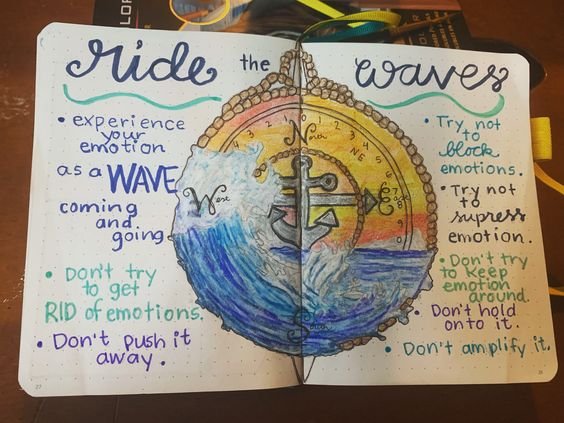

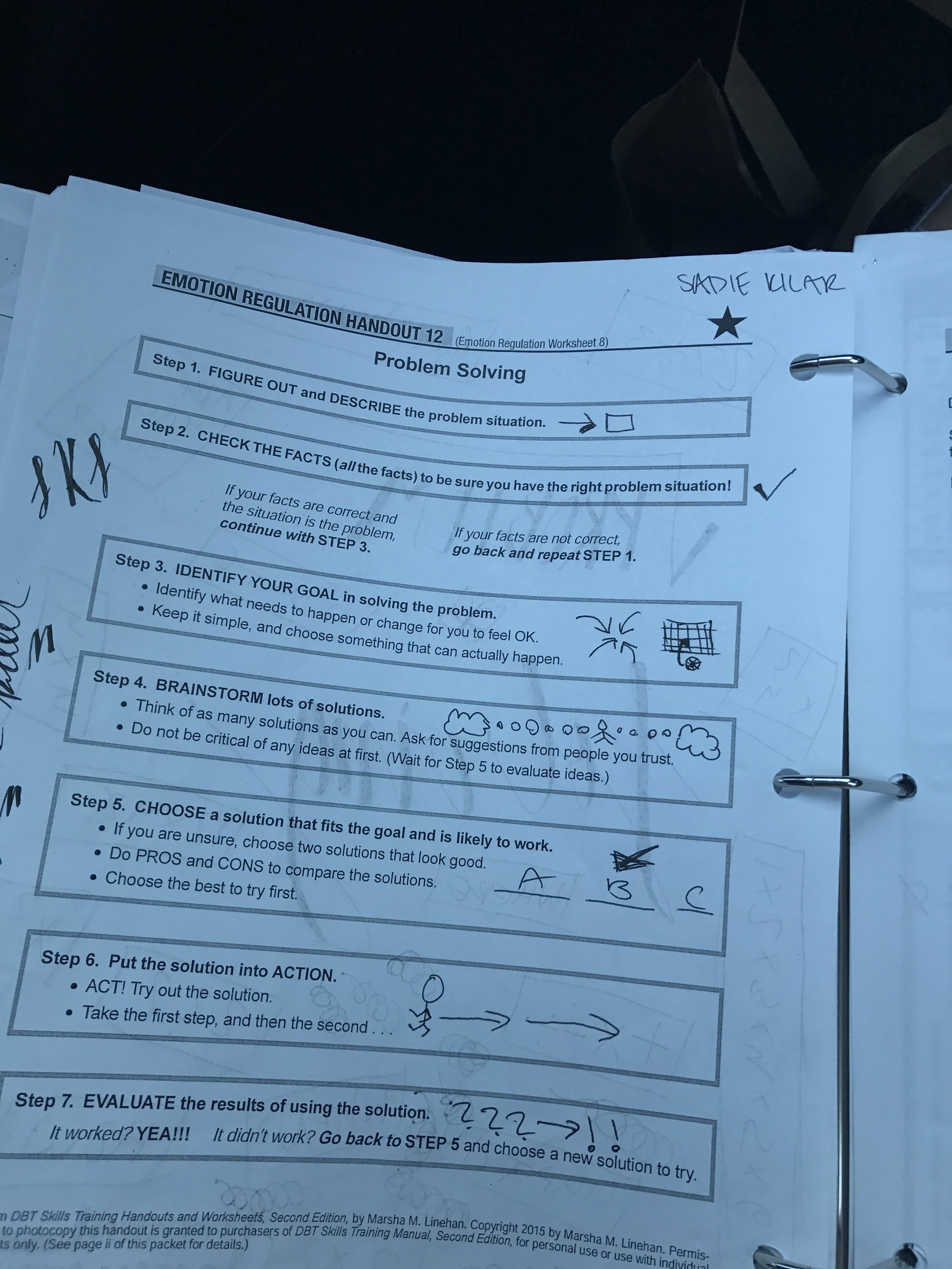
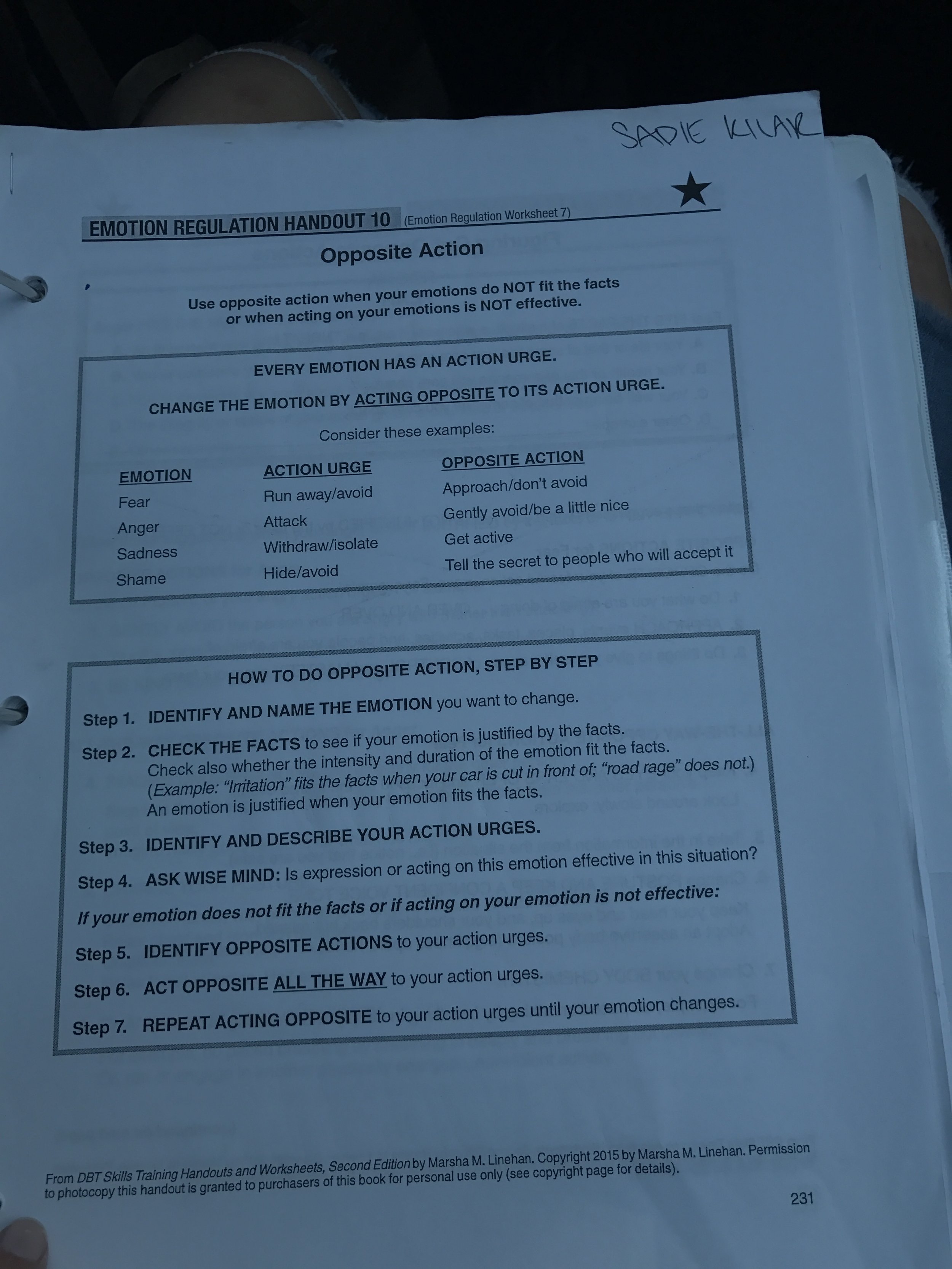
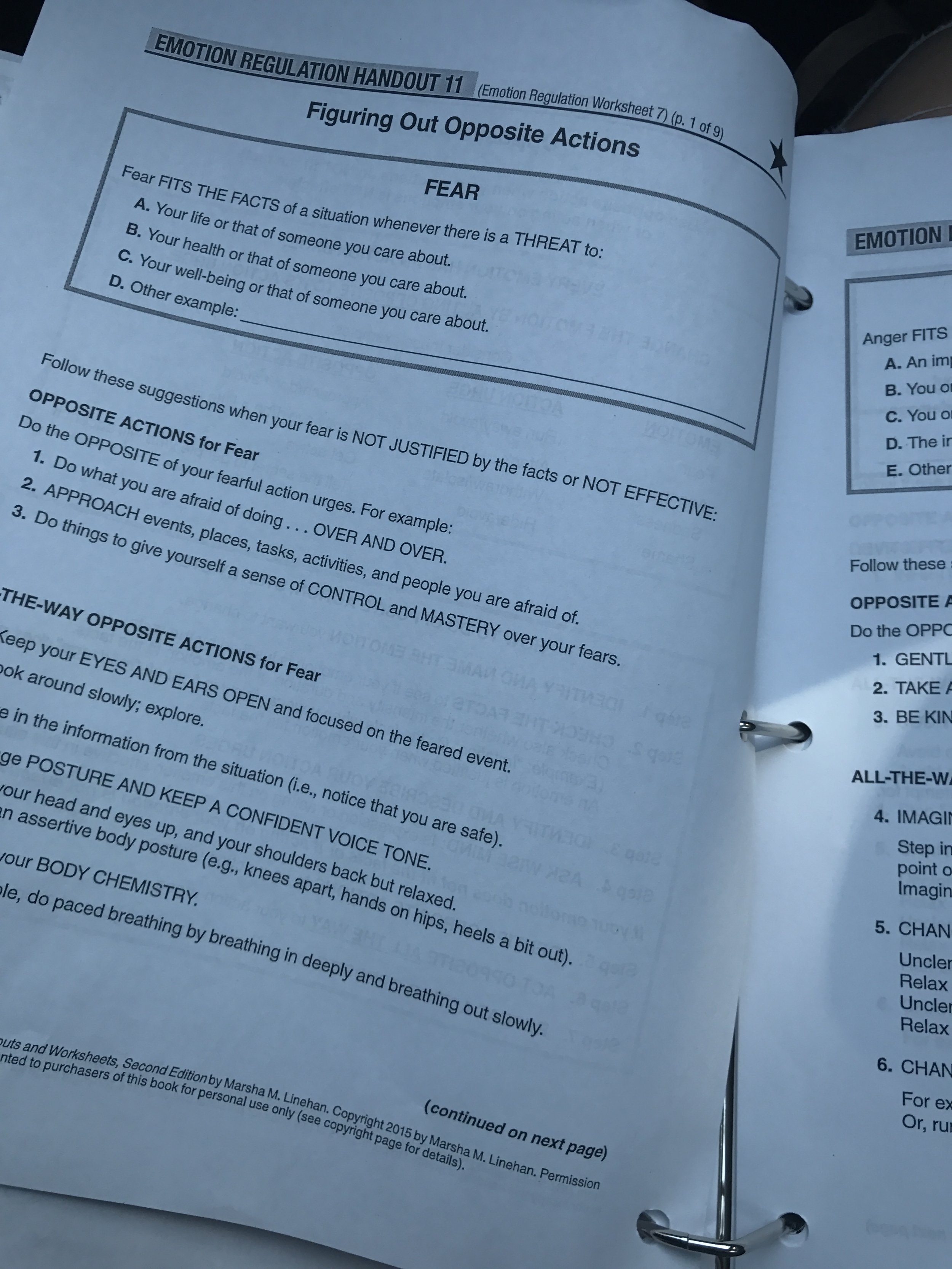
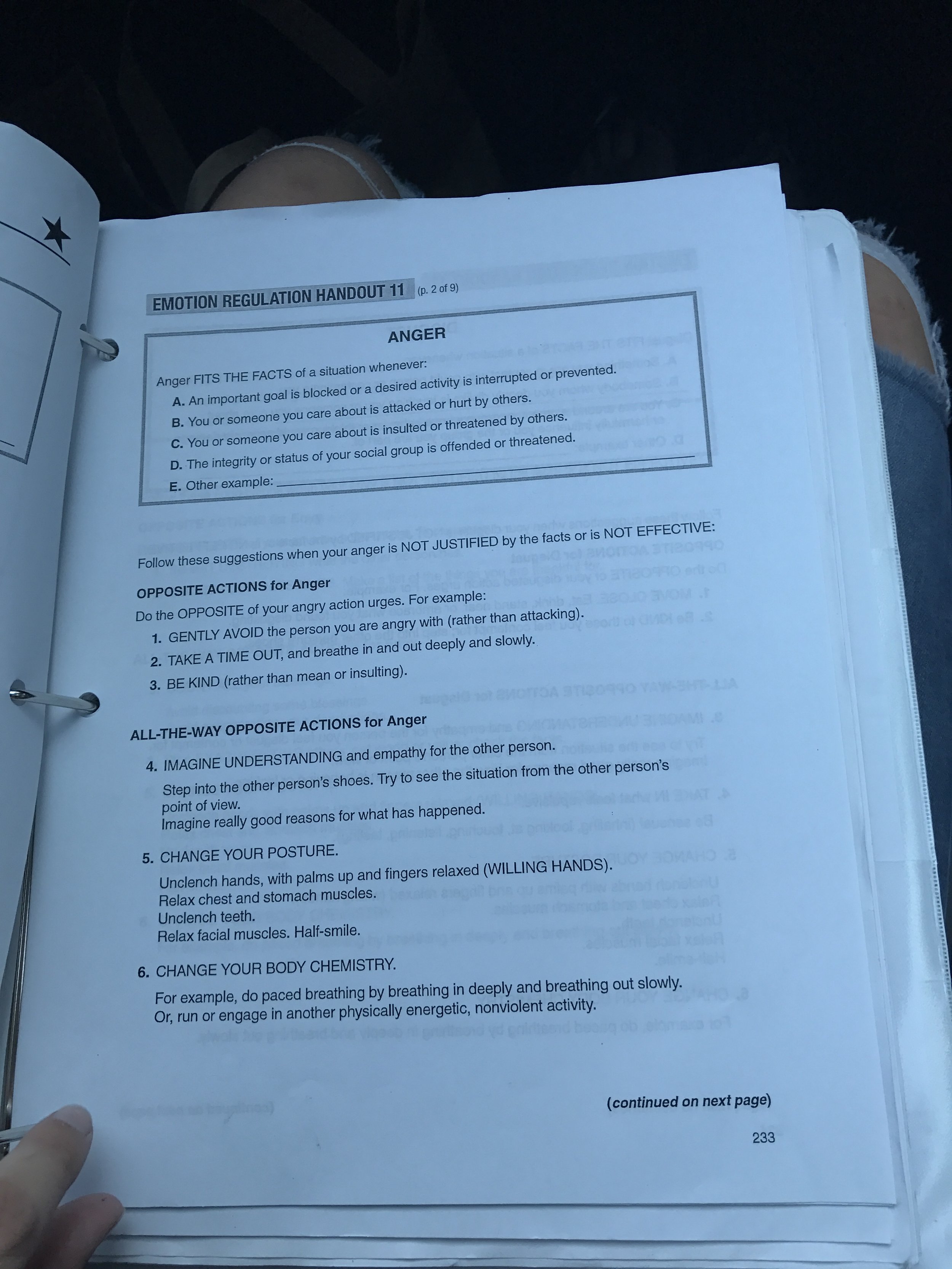
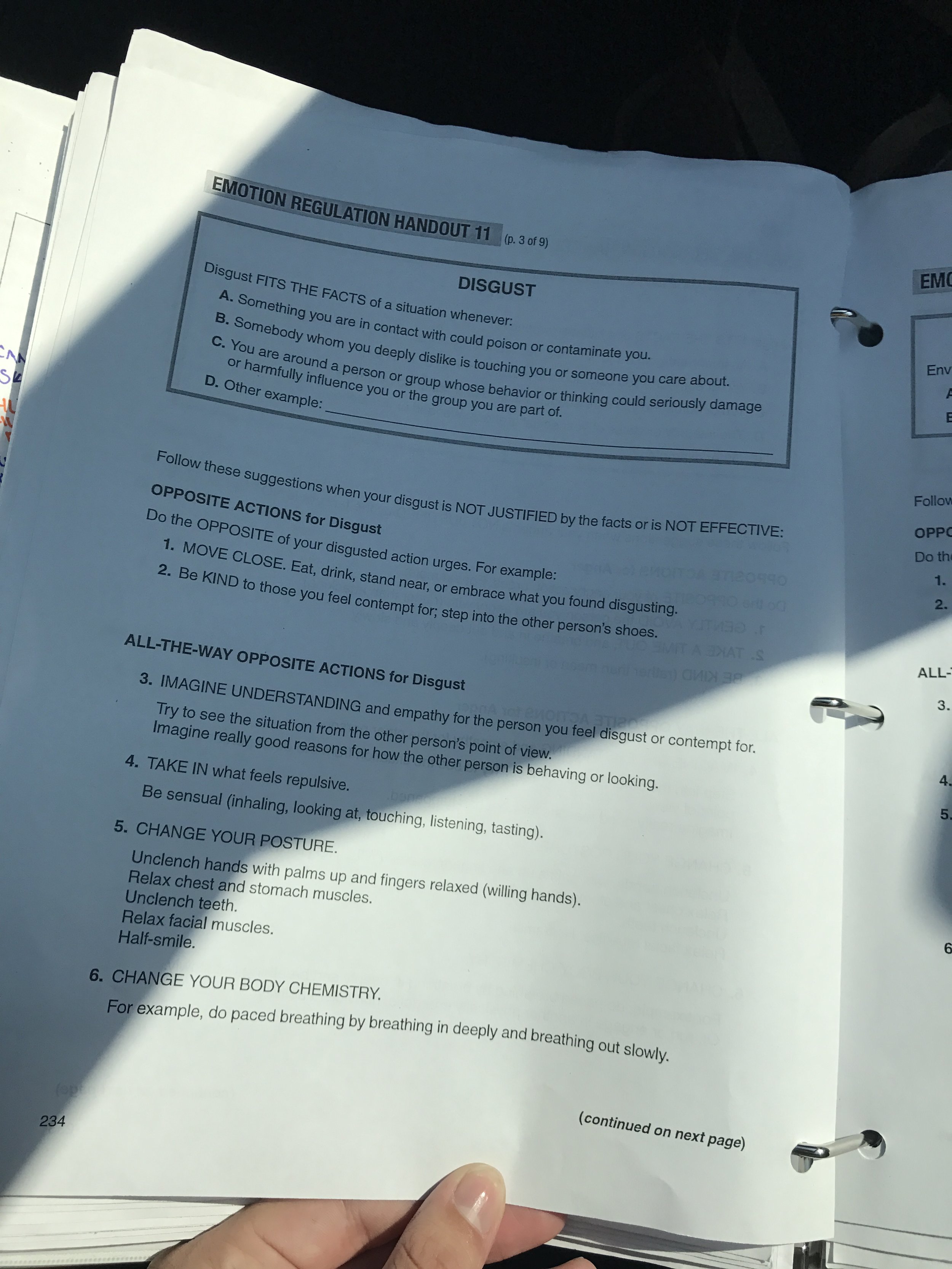
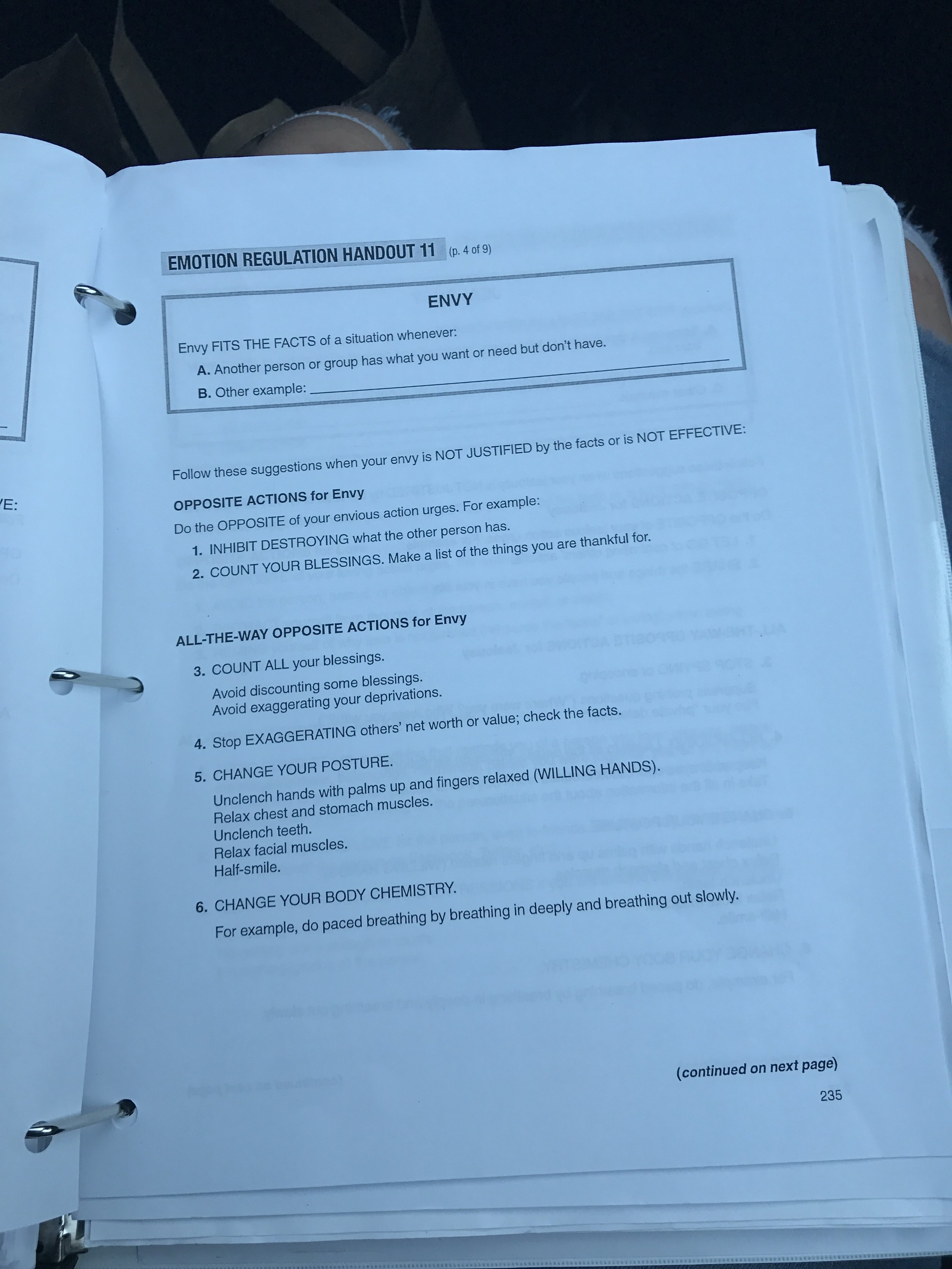
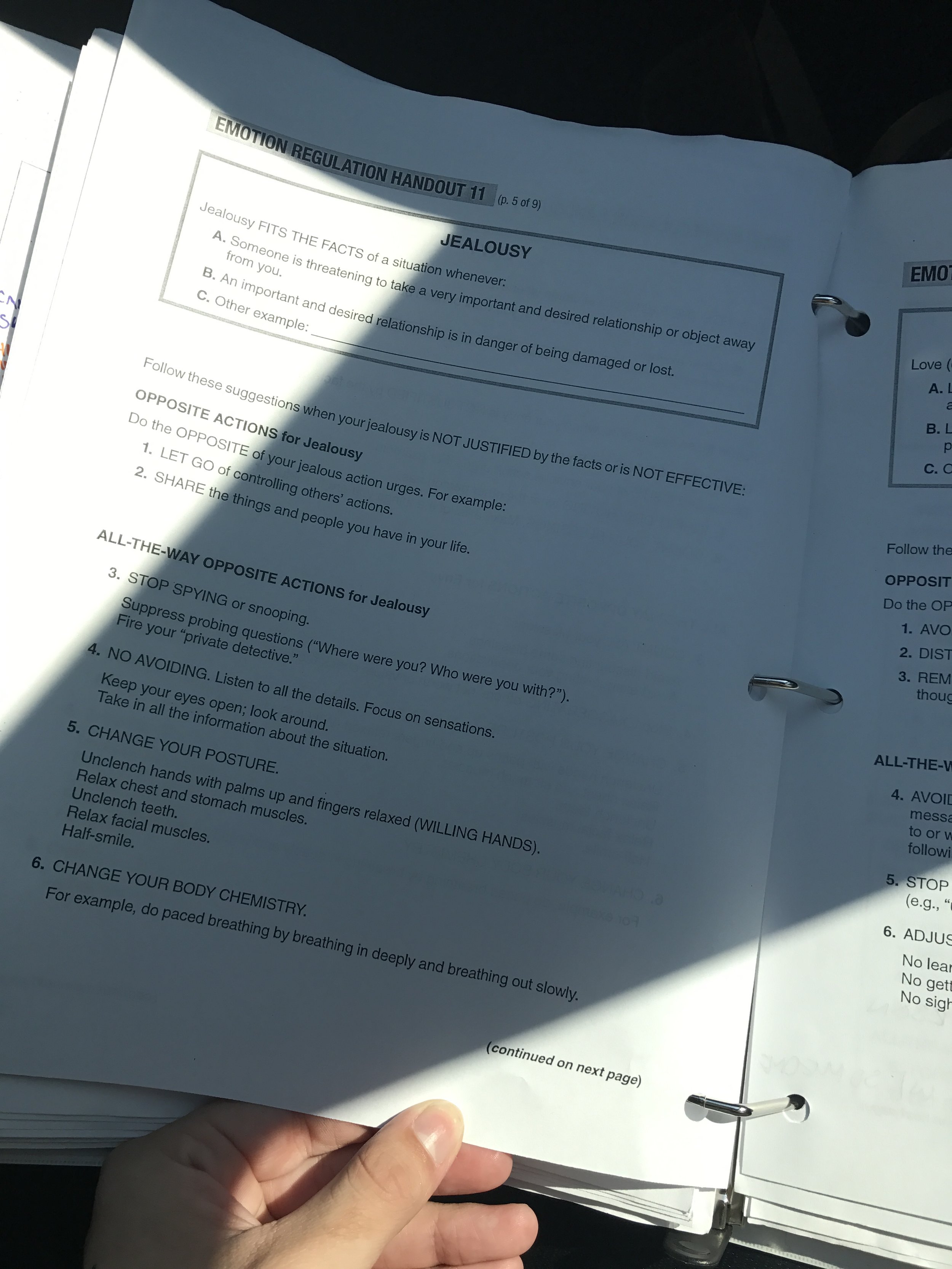
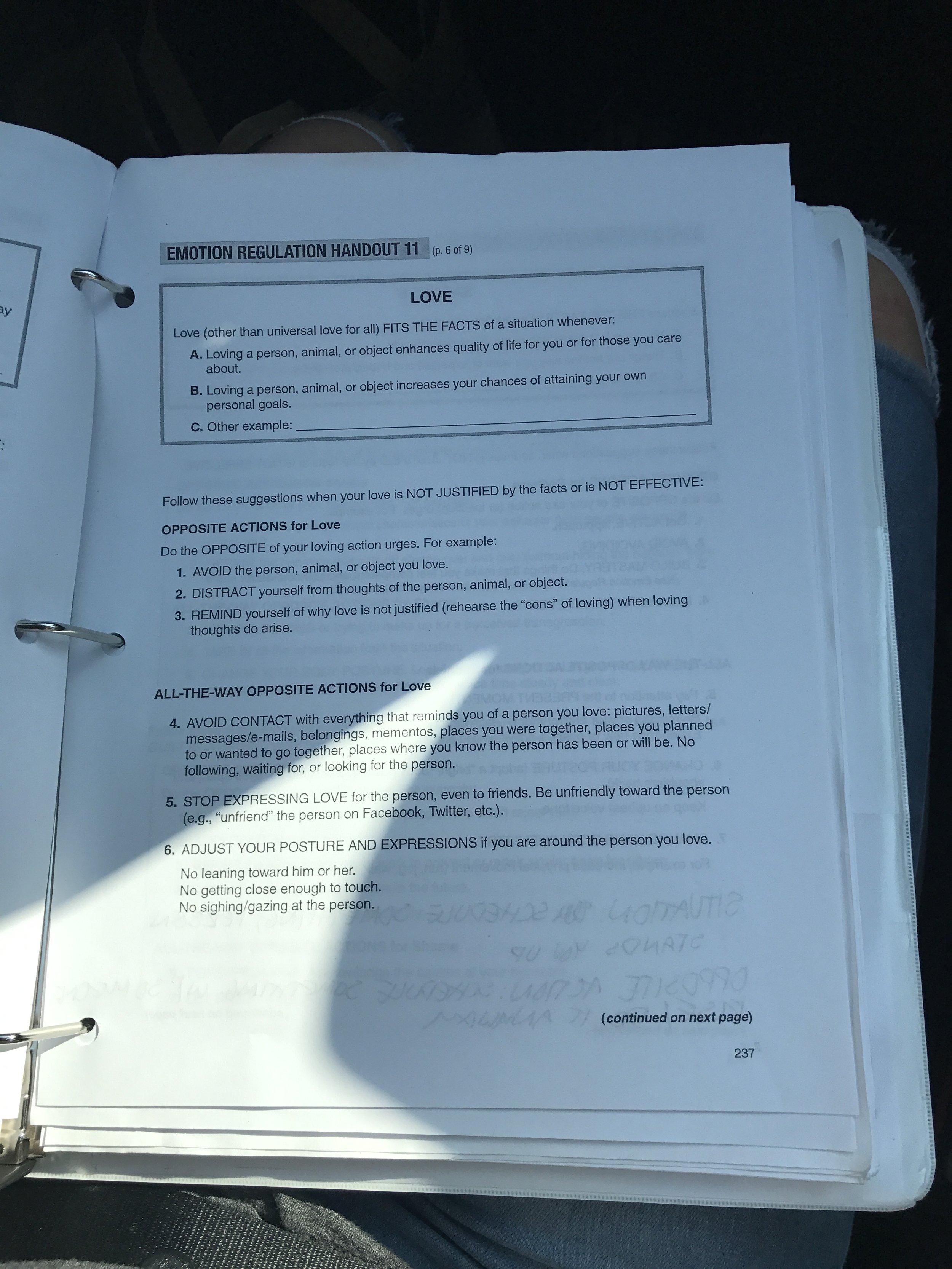
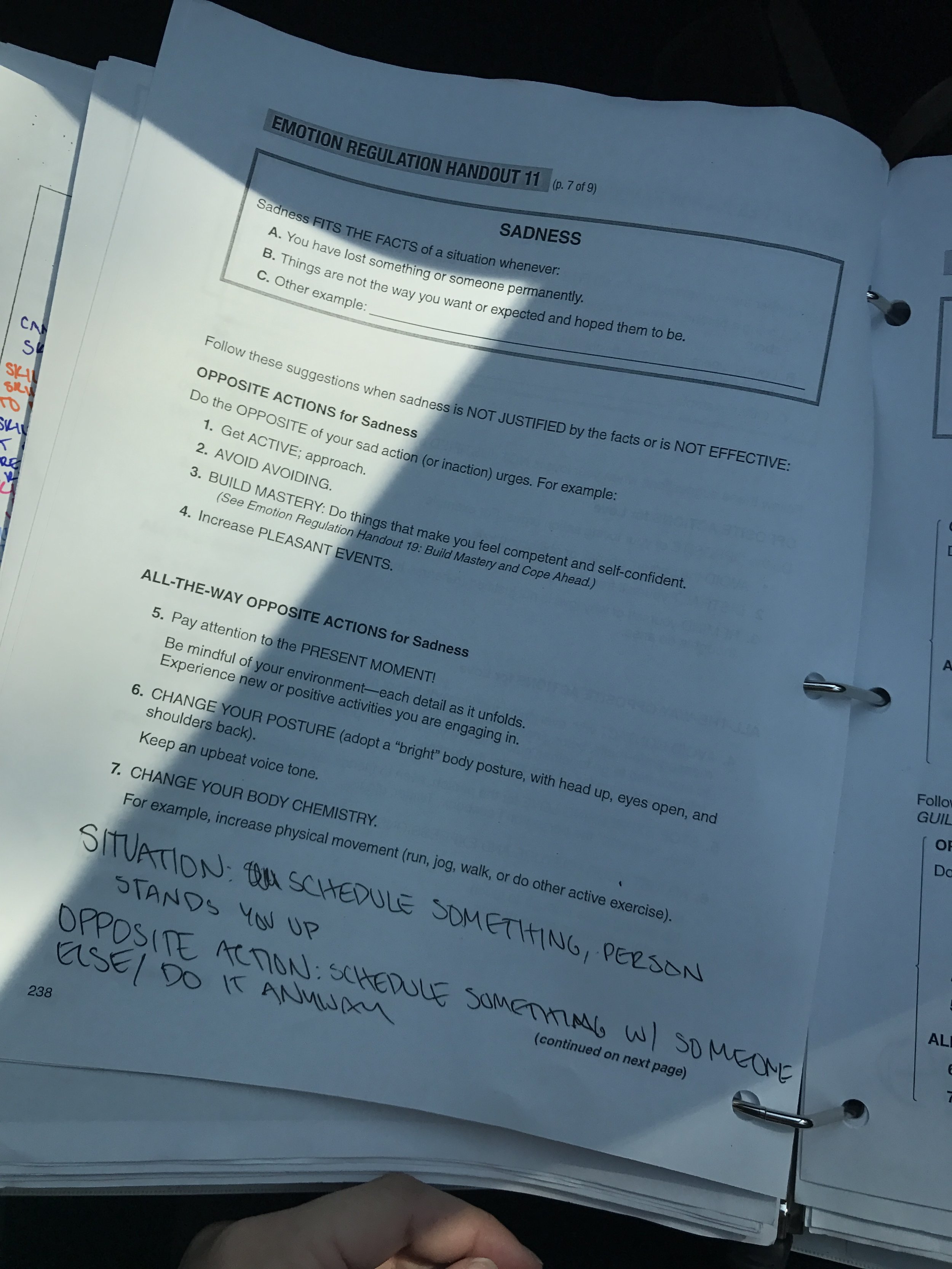
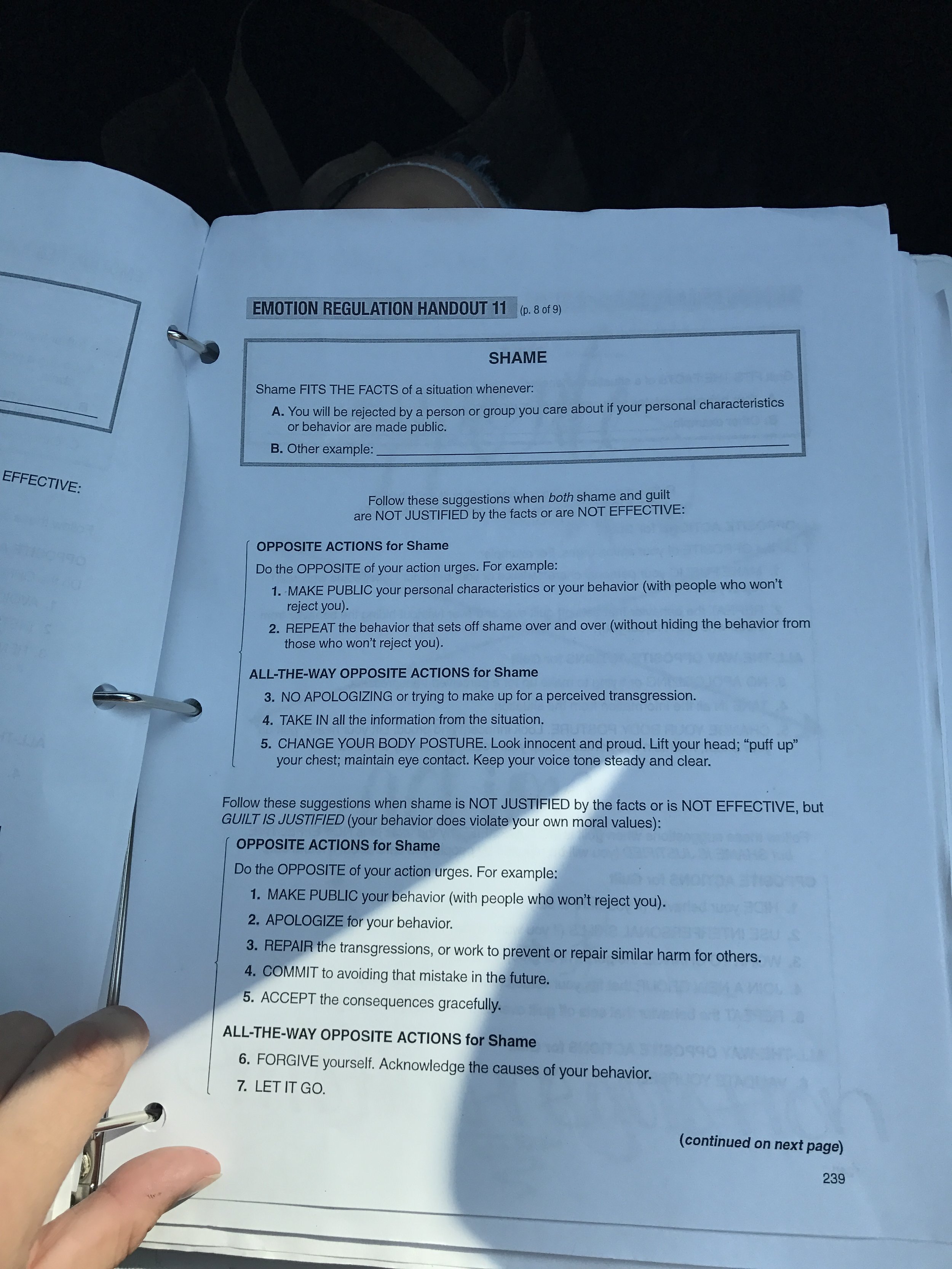
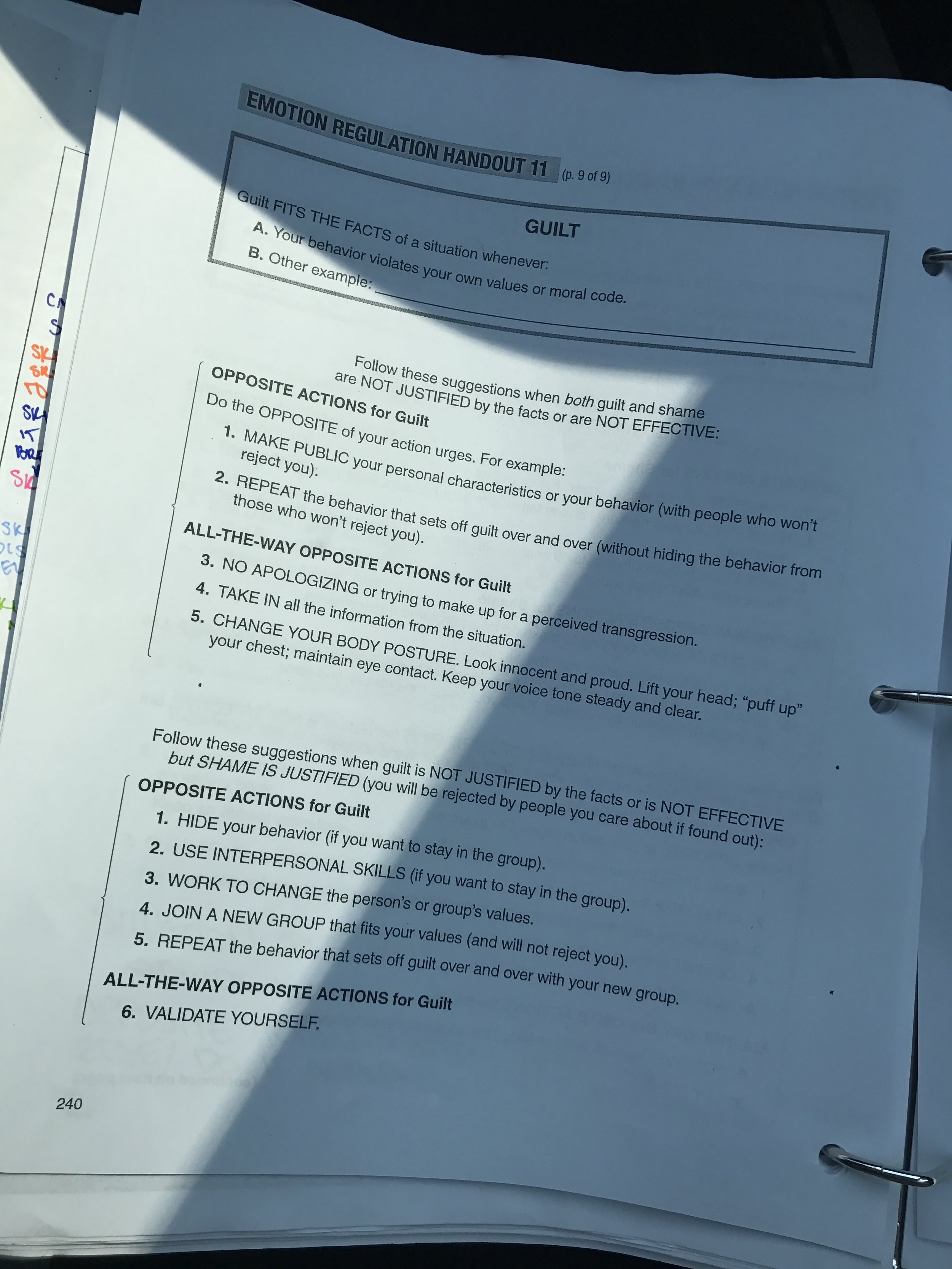
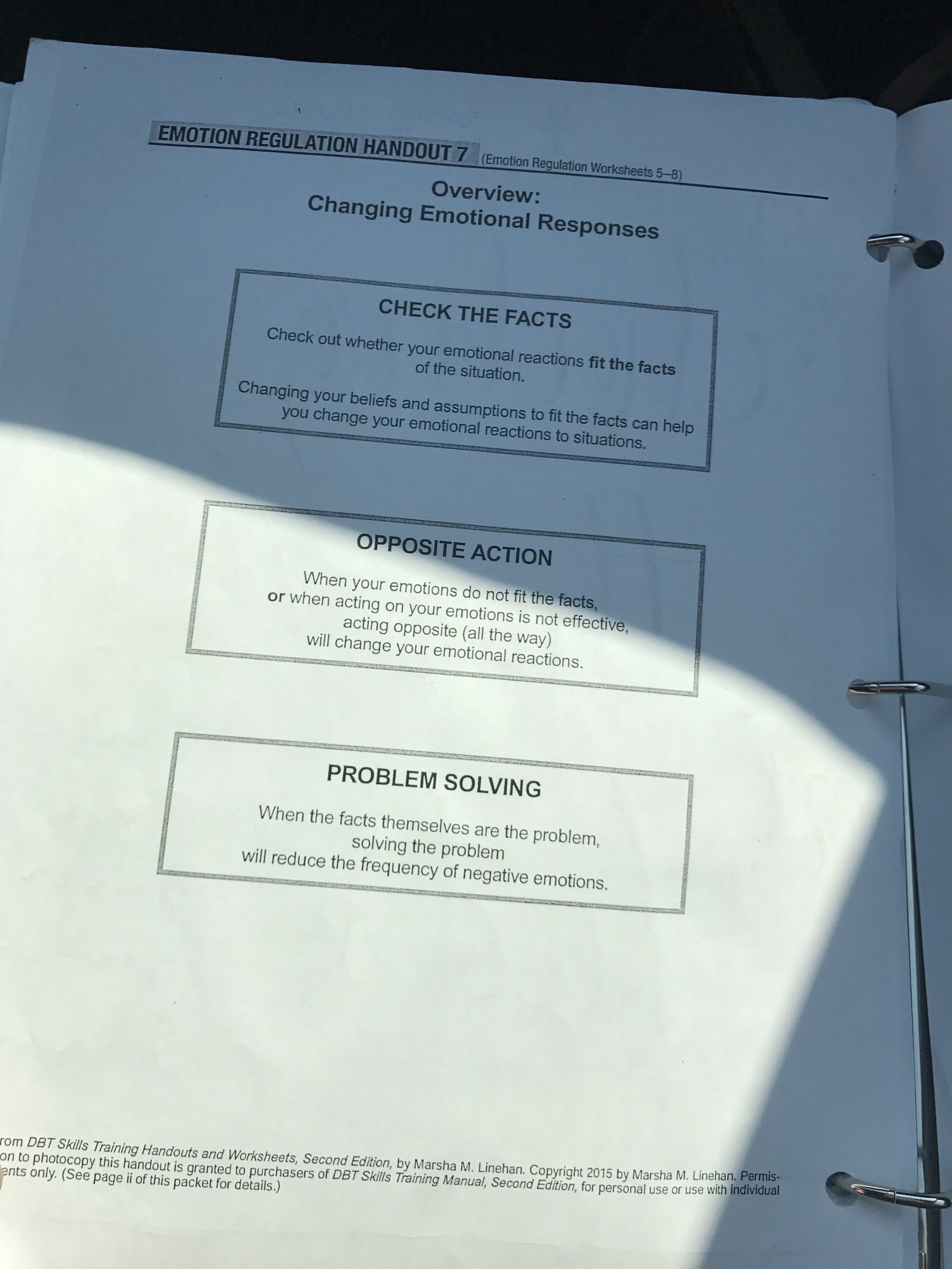
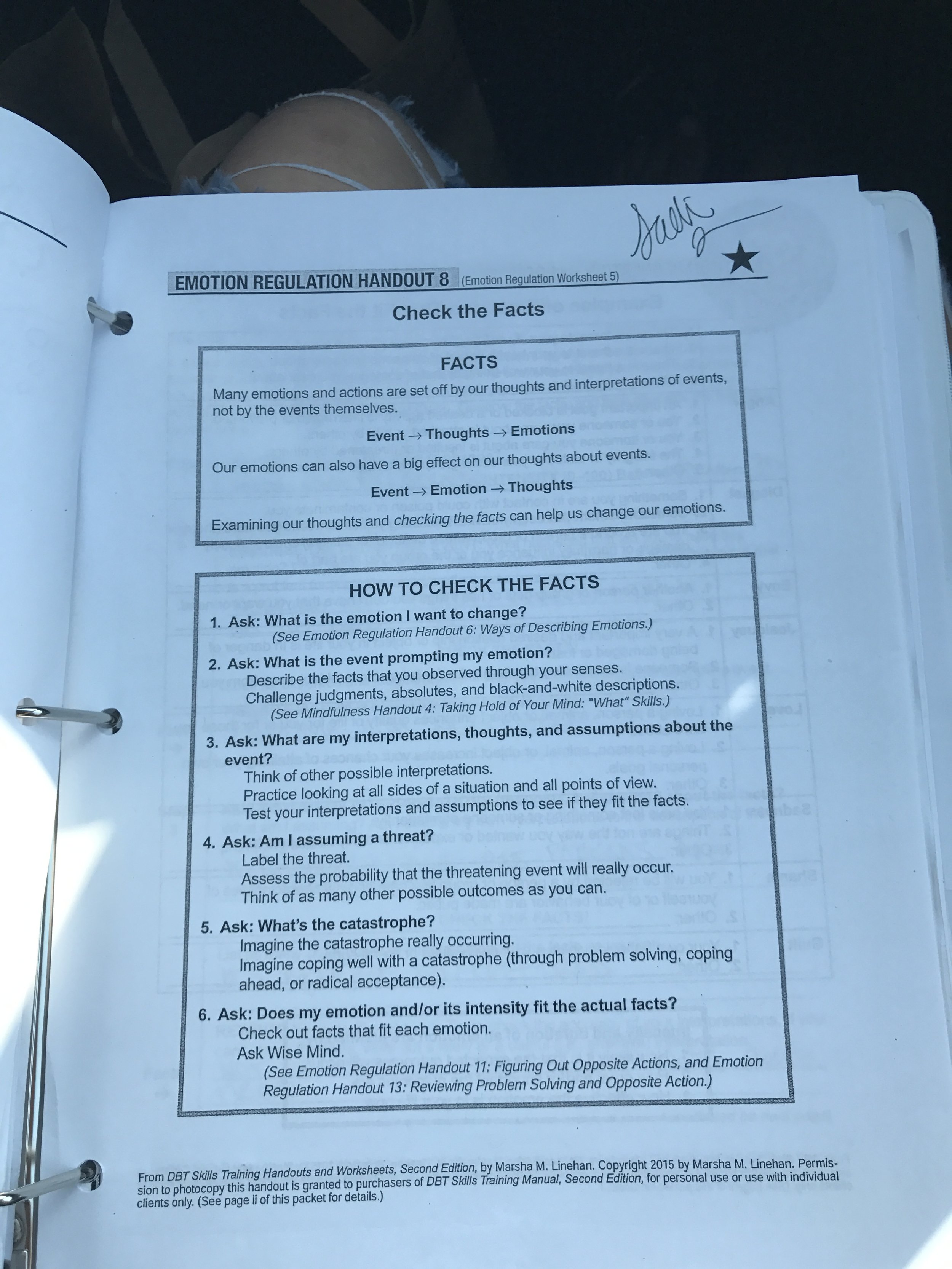
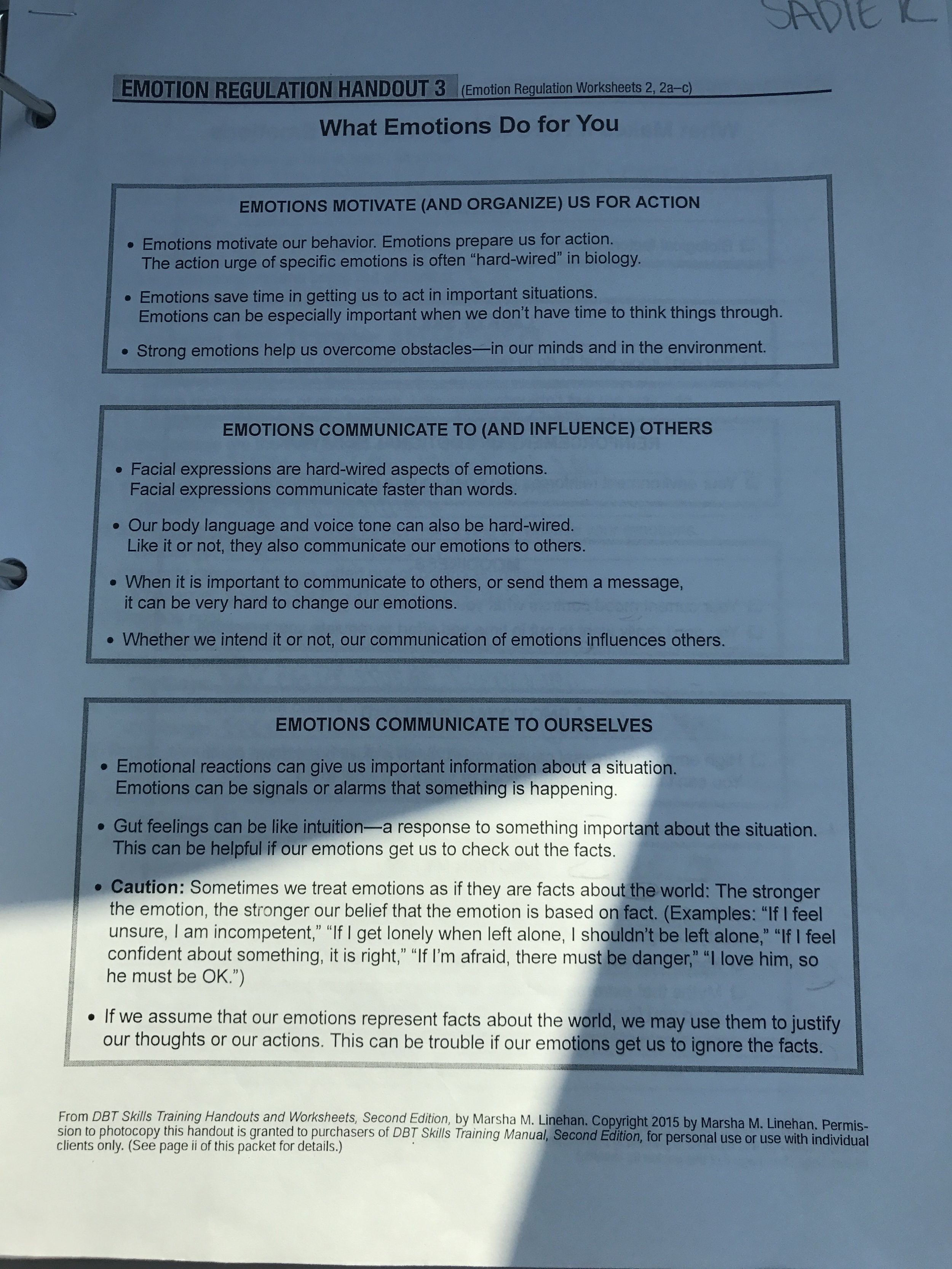



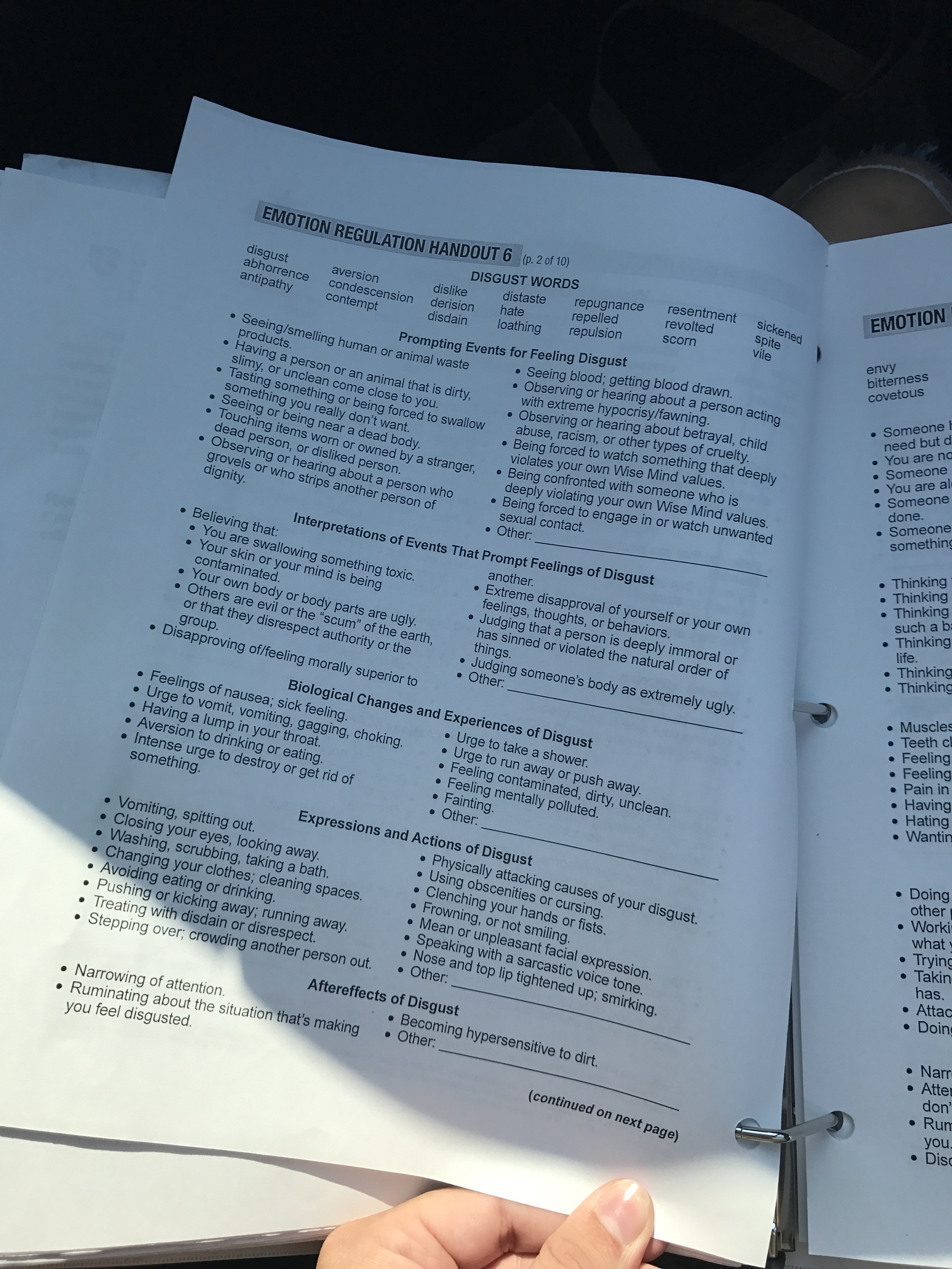

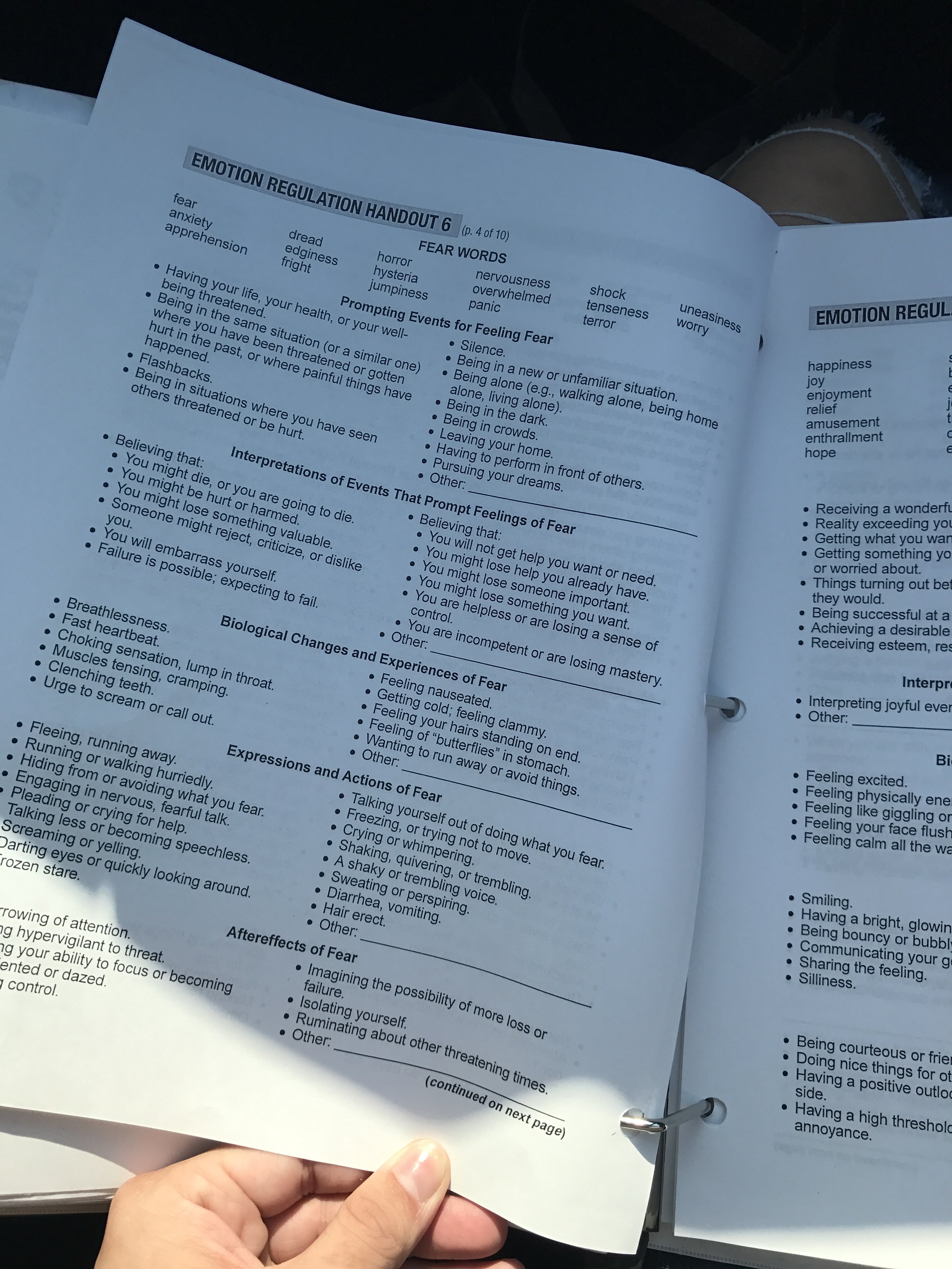
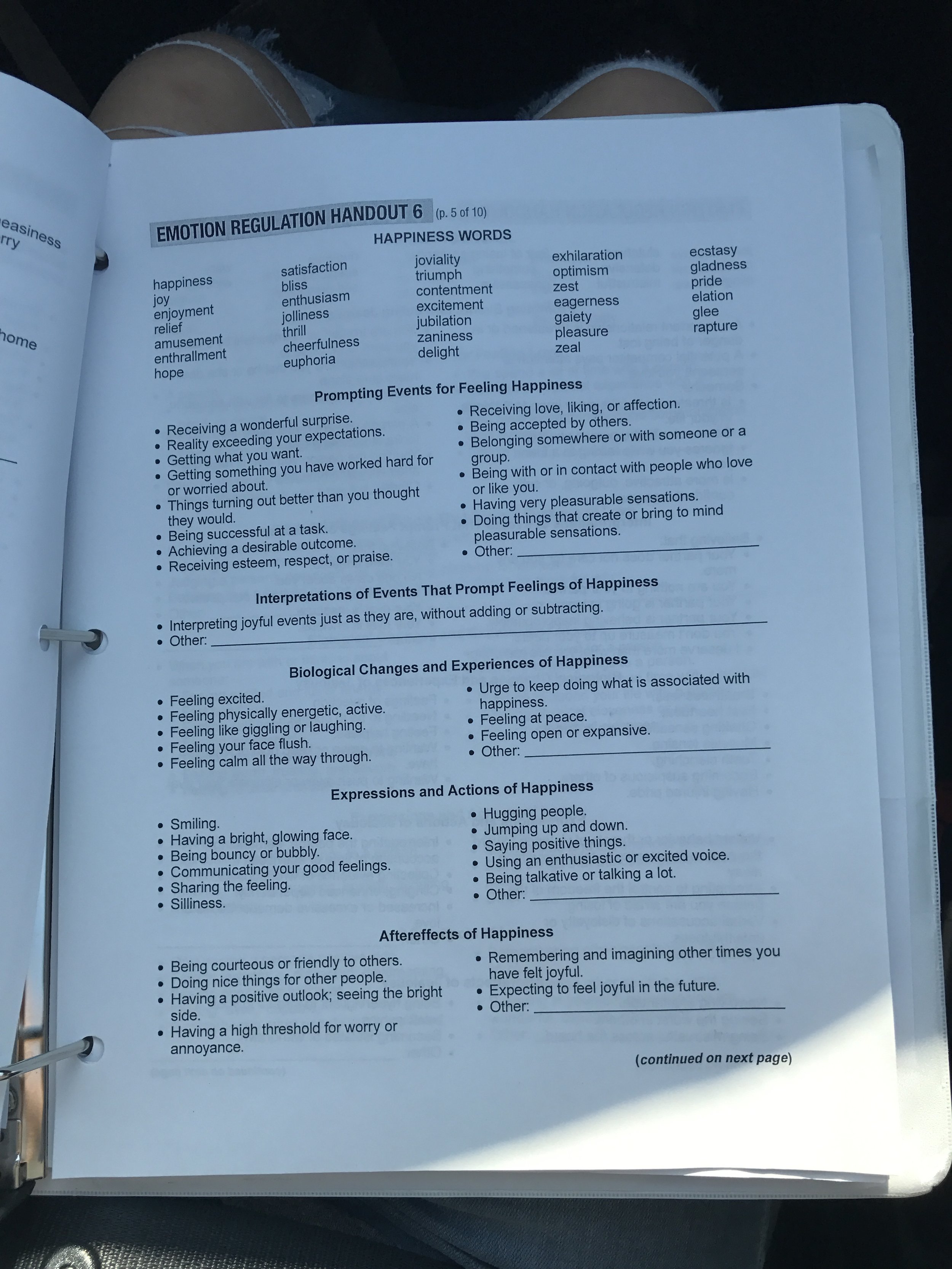
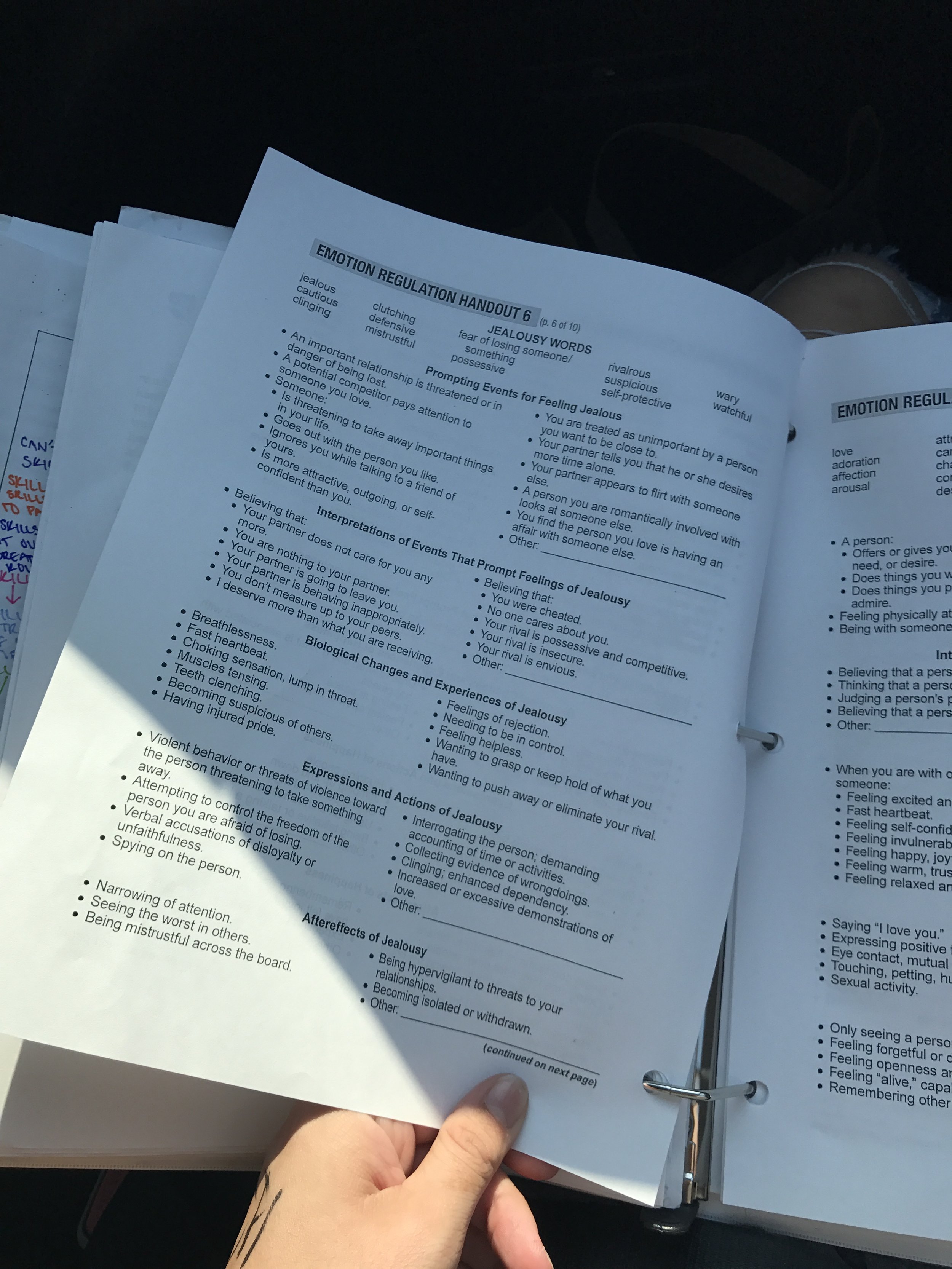
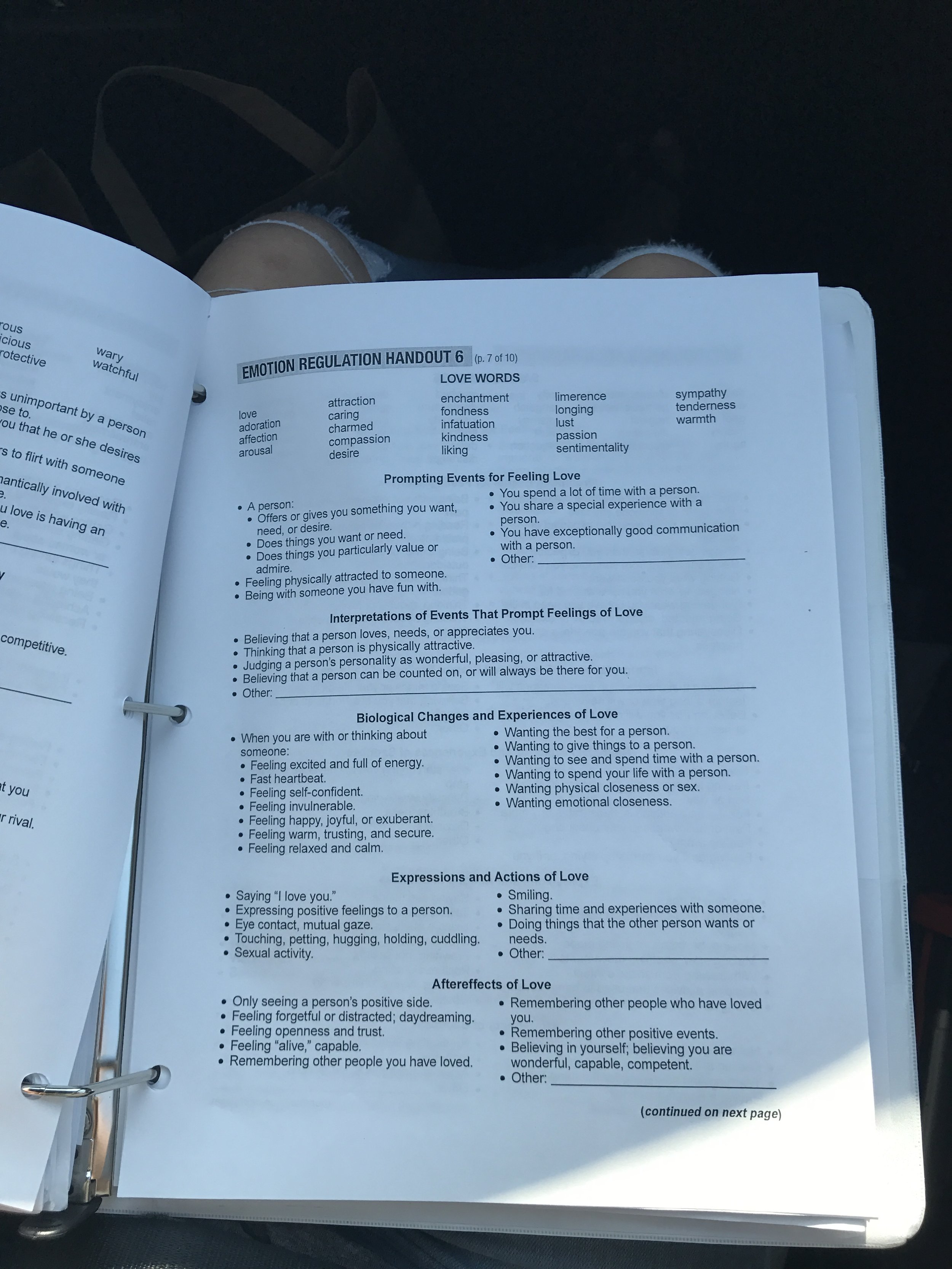
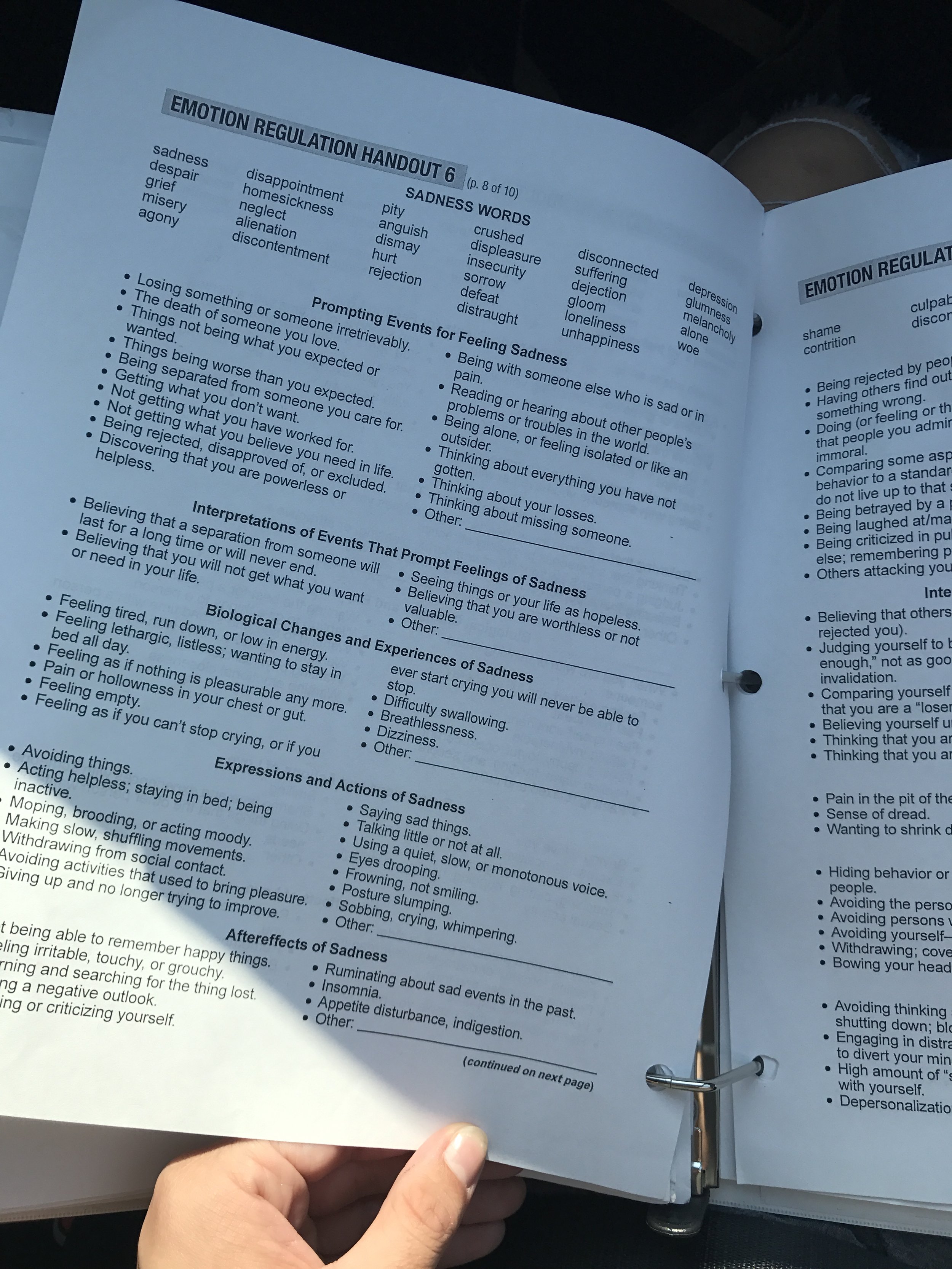
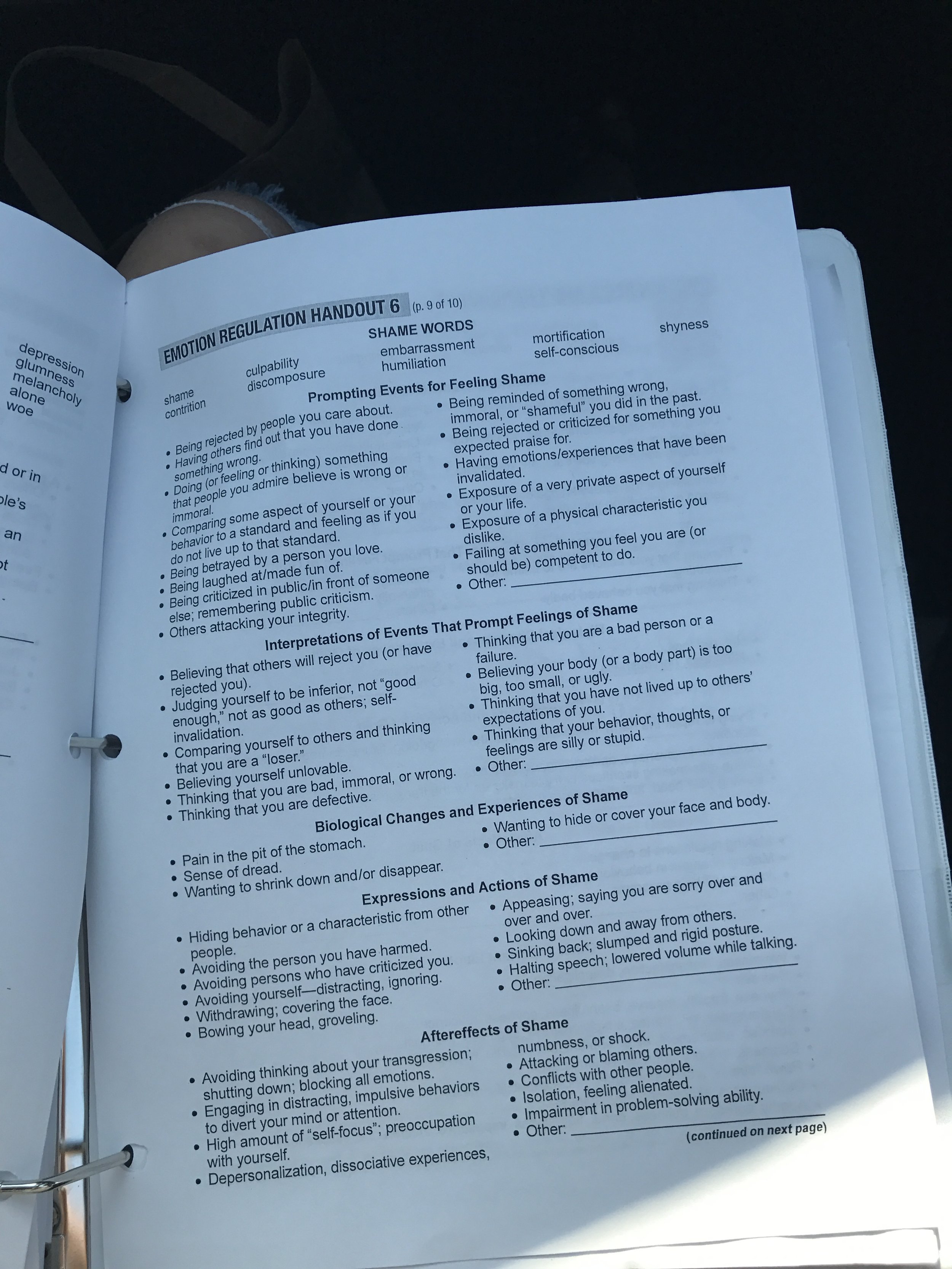
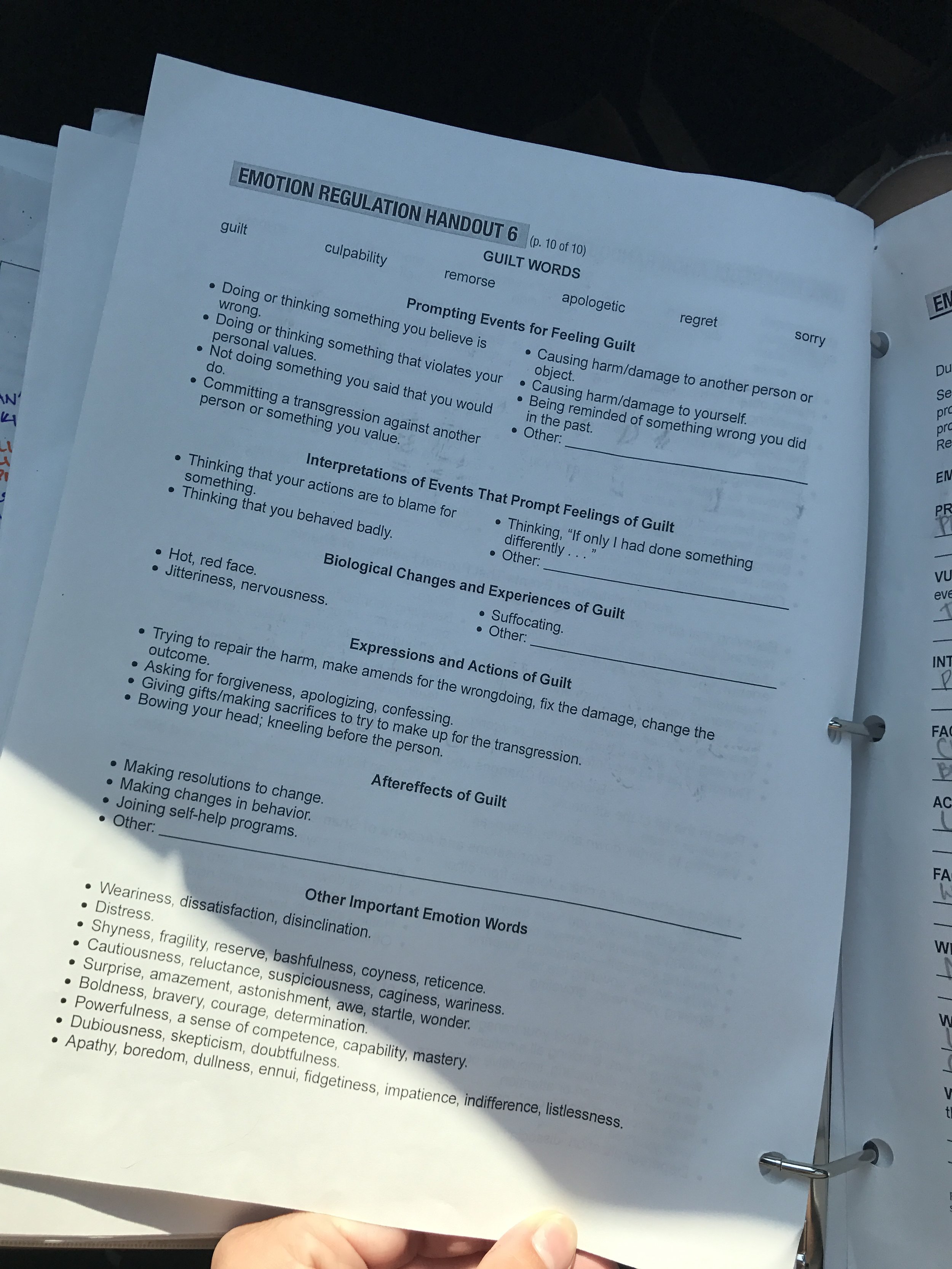
About She Persisted (formerly Nevertheless, She Persisted)
After a year and a half of intensive treatment for severe depression and anxiety, 18-year-old Sadie recounts her journey by interviewing family members, professionals, and fellow teens to offer self-improvement tips, DBT education, and personal experiences. She Persisted is the reminder that someone else has been there too and your inspiration to live your life worth living.
a note: this is an automated transcription so please ignore any accidental misspellings!
Sadie: Welcome to she persisted. I'm your host Sadie Sutton. Every Friday, I post interviews about mental health dialectical behavioral therapy and teenage life. These episodes break down my mental health journey, teach skills to help you cope with life and showcase testimonials from individuals, including teens. Whether you've struggled yourself or just want to improve your mental fitness. This podcast is your inspiration to live a life you love and keep persisting
This week’s DBT scale is the ride, the wave scale. You're going to get a whole lot of DBT education in this episode, but we're going to start out with a small, simple skill you can implement that allows you to just experience your emotions as you are. So rather than trying to get rid of emotions, pushing them away, block them, suppressing them, all of those things. You're going to experience your emotion as a wave coming and going. You're not going to try to keep the emotion around a long aide at you're not going to hold on to it or amplify it. You're just going to let the wave of the emotion rise and then fall no emotion is constant or consistent with it. That sadness, anger, depression, anxiety, even joy. So what you're going to do is you're going to lean into that process and let the wave of the emotion, the urge wash over you and then dissipate.
So with that mindfulness skill out of the way, let's dive into the rest of the episode. Hello. Hello. And welcome back to another episode of she persisted solo episode today. And I'm very excited. I feel like the past, literally five or 10 episodes I've recorded, something has been sad about how lacking emotion education is.
And this episode is here to rectify that I'm going to share everything that I've learned through DBT, through therapy, about emotions, about emotion, education, about their functions, how you can cope with them. So that. Cope and feel your emotions in a more educated and equipped way emotion and mental health education in our school system is so locking.
We know this, it's an accepted fact at this point, but as you hear about all of these different things throughout this episode, I really think you're going to be like, why, why didn't I learn this in elementary school, in middle school and high school, because it's so universally applicable. Every single person has emotions.
Every single person, experiences, emotions, all of these things would be beneficial to learn about and know about, and hopefully we'll move in that direction.
Another huge, thank you that I have for every single one of you is that we are at our highest monthly downloads that we have been at in a year. That's crazy guys. I have been really on the new year's resolution of doing weekly episodes. I'm really proud of the content that I'm putting out and I'm seeing on the backend that you guys are liking it as well.
So thank you for tuning in. Thank you for downloading episodes. Thank you for listening to them. It means the world to me, and it makes me so happy that we can really just change teen mental health. So thank you. Thank you. Thank you. As always, if you're liking what you're listening to make sure to share it with a friend post about it on social media at LIBOR review on apple podcasts and Spotify, you know what to do, but a huge thank you for me to you for that.
So before we dive in, we're painting a little picture for you. It's Saturday night at 11:00 PM. We just got a lot of snow in Philly. There's a huge snow storm going through the east coast and I have zero desire to be in the snow at all today.
So I'm holed up in my dorm room. We're doing a little podcast recording. I did go out earlier today to take the trash out. And that was enough snow exposure for me. I was like, this is, this is great. I'll see the snow tomorrow, but today while it's still actively snowing, I think we're good. Especially not at 11:00 PM at night.
I did get this new jacket that goes all the way down to my toes, which I'm very excited about. It's going to look a little dorky. It's going to look a little crazy, but I'm going to be warm and that's all that matters. So with that, this is, this is what's happening. 11:00 PM on a Saturday night, super crazy college freshmen life going on over here, let's learn about emotions.
All right, you guys, you know what I'm going to say. Magic mind. Really? The semester has been kicking my button a bit with classes and work and the podcast we're grinding or trying, but things are busy. Being really intentional about every hour of the day, how I'm spending my time and being productive has been essential and staying on top of all of my responsibilities.
And that is where I have a tip for you. That tip is magic mind. It is a, an all natural productivity drink with adaptogens, nootropics, and macho. So it helps decrease stress. It boosts blood flow and cognition keeps you focused and it helps fight off procrastination, brain fog and fatigue. This is perfect for that mid day slump. When you've been in classes, you have to start getting homework and studying dumb, but you're just struggling to put the pen to paper and get that work done.
This totally eliminates that and helps you continue that flow state throughout your day. It looks like a little juice shot. It comes in the cutest packaging. You keep it in your fridge. You can also use it at room temp. You shake it up before you drink it. And I drink it in the morning with my cup of coffee and I don't have to do multiple coffees throughout the day, keeps me focused.
It keeps me intentional and it keeps me on track with my to-do list. So to all of my busy students and individuals who just have so much to do every single day, you got to try out magic mind. What you're going to do is you're going to go to magic mind.co/persist head, and you're going to use code persisted for 20% off your order. So that's M a G I C M I N d.co/persisted. Or use code persisted for 20% off your order@magicmind.com.
So most of what I'm going to share for you comes from a dialectical behavioral therapy basis which shorthand is DBT. So when you hear me say DBT dialectical behavioral therapy, that's what I'm referring to. And a lot of it is what I learned from when I was in treatment. So I'm reading off worksheets.
I got I'm reading off notes that I took versus is what I learned from the best of the best clinicians number one, psych hospital in the world. It's a Harvard affiliated hospital. It's an amazing program. And so you are getting the cream of the crop, the best information out there. So to give you the fastest explanation ever. DBT dialectical behavioral therapy was created by Marsha Linehan for adults that were struggling with borderline personality and suicidal ideations. So super, really big, heavy, overwhelming emotions that presented at a lot of different ways that made it really hard for cover and heal and function.
So there have been dozens, if not hundreds of studies done now on DBT to decrease things like suicidality, depression, anxiety, and it's really a bunch of skills education. There's the therapy part of it. There's the group therapy part of it. Sometimes medication is involved, but when I'm talking about DBT, especially on the podcast, I'm mostly talking about the skills because that's what I feel like is so universally helpful.
It's what you can implement in your life independently. And that's, what's a game changer for so many patients meet included. So that's DBT, I'll link more about it in the show notes below. So you can go and read the studies. If you want to, you can learn more about Marsha. She's an amazing memoir. If you want to hear about why she started it, she did struggle herself, which is a really cool story to hear about, but that's DBT.
So emotions as inconvenient as they are as uncomfortable as they can be, they really do have a purpose and that's what they motivate us and they organize us for action. So if we both go back to caveman days, emotion served a really important purpose and that's motivating us and it's organizing us. And I'm reading literally to you for my notes from my abnormal psych class at Penn that we talked about this week, which is crazy worlds colliding.
But when we think of emotions, when we think of their purpose, it's really the more primitive and ancient brain. And it's because it's what kept us alive. Humans are not very strong creatures. We don't have crazy Claus. We're not super fast. We're not super strong. What allowed us to survive and get to this point and reproduce was our ability to work together.
And communities was our ability to be able to fight or flight when we came into contact with an aggressor and things like that. So what emotions are doing when we feel them as they're saving us time and getting us to act in important situations, when we don't have time to think through things, when it's like life or death, emotions get us to move and they motivate us.
Strong emotions are what allow us to overcome obstacles, both in our minds and our environment and the ways that we express emotions like our facial expressions and our body language are the hardwired aspects of emotion. So there was this amazing study that was done, where they went around the world, they looked at people and north America, south America, literally every single continent, they went to tribes, which didn't have much interaction with other communities.
And they asked people to express an emotion based on a stressor or an event. So they had them express things like anger and sadness and discussed. And these expressions that people created were universal across cultures across time, across environments. And it's because it's a biological process.
It allows us to communicate to others what we're feeling before we can voice it and say it. So if there's a giant saber tooth tiger behind someone, we look scared. The person knows that as a threat. So there's a lot of really funny, interesting things about how your body reacts to emotions, which I heard about this week, which I wanted to share for anyone who's interested in psychology.
These are some funny little tidbits, but when you're feeling anxious, when you're feeling scared, you get sweaty. And the reason you do that AC because it makes you more slippery. So if a predator is trying to grab onto you while you're like running away, it makes it harder for you to be grasped onto you.
And it increases your likelihood of escaping. Never heard that before. I thought that was so interesting. Our vision goes blurry when we're feeling anxious to try and make our pupils dilate better, to make us focus and see things better. Goosebumps conserve our heat blood flow moves to our extremities so that we can run and fight as best as we can or bladder wants to empty.
So that we're as light as possible so that we can run as fast as possible to escape a threat.
And there are so many other things like that that really emphasize that this is a primitive nature. This is our survival of the fittest coming through and our emotions serve a purpose. They're telling us things and they're allowing us to, to survive and procreate.
So with that being sad, we quite obviously no longer live in caveman days. We are living in modern society. We're not running into a saber tooth. Tigers are stressors look really different. And we're now at a point where a lot of us can find it difficult to regulate our emotions because they're no longer just keeping us alive We're experiencing extreme stress with school and work. We are having to prove ourselves socially, not just stay alive and connect with others that we have a group to fight with. And so there's a lot of things that can go into making it hard to regulate your emotion. There's the biology, there's the lack of skill.
There's the reinforcement of emotional behavior. So if your environment is reinforcing you, when you're highly emotional, there is moodiness. So that's when your current mood is controlling, what you're doing instead of your logic. Maybe you don't really want to put the time and effort into regulate your emotions.
You always have that choice. Another factor is emotional overload. So when you are so highly, emotionally aroused that you can't use skills, you can't follow instructions, you can't figure out what to do. And the last thing is emotion myths, which is really what we're targeting in this episode. So it's mistaken beliefs about emotion that get in the way of you being able to regulate your emotions.
So an example of one of those would be a myth that emotions are bad or that they're weak. So you're avoiding them, you're suppressing them. And then they come out as bigger and more overwhelming. Another myth that you might believe is that extreme emotions are necessary, are part of who you are. And that could keep you from regulating them.
so one thing that I just talked about there with what makes it hard to regulate emotions is the biology. And this is something that's really unique to teens, your prefrontal cortex, you are at logic part of your brain. It's right by your forehead. Isn't fully developed until you're in your mid twenties.
So as a teenager, you are already more susceptible to feeling more emotions, to feeling your emotions more strongly and being less able to logic through situations. Like that's just how your biology works. So if you're put in the same situation as an adult, the adult is biologically already at an advantage to be able to logic through things, to be able to do a little pros and cons, whereas you are more likely to be emotionally overwhelmed and experience a more intense emotion when faced with the exact same stress.
And I don't think that's talked about enough. I feel like that should be a common fact that like teenage emotions are a lot more strong. They're a lot more overwhelming. They're more difficult to cope with. So what can we do to counteract that?
And this is where, where we're going to get into describing emotions and understanding them. So there is a model for describing emotions and on Lincoln in today's show notes and put it up on Instagram as well. But it's this whole chart.
Basically, when you go into any situation, you have preexisting vulnerability factors. So maybe you're really tired. Maybe you are already really angry at the person. Maybe you are having a bad day. All of these things make you more susceptible to feeling something, and that can influence your interpretation of the event.
So that's your thoughts and beliefs about the prompting event that's causing you to feel something, and it can also influence your attention on your awareness on of the prompting event. So with that point, knowing that all that stuff is going into the interaction beforehand, when you're actually feeling the emotion, there's a biological change that's happening.
Your brain has neurons firing. Your nervous system is reacting. Like we just talked about your heart rate is increasing. Your blood vessels are tightening. Your temperature is changing because your body is doing what it biologically knows to do to keep you alive and keep you safe.
And there's also the experiences that you're having in tandem with the biological changes. That's those bodily sensations, feelings, and action urges. And then at the same time, you are exhibiting expression. So your face and body language, your words, and your actions are all tied in with that emotion.
And that's where we get to the emotion name and the awareness after you have these biological cues and these expressions that have been influenced by your interpretations and vulnerability, you are experiencing an emotion. So let's give an example here. So let's say I wake up in the morning and I didn't sleep well the night before.
That's my pre-existing factor. My interpretation is that this day is going to be bad because I'm already tired and my alarm goes off. That's the prompting of that. I immediately feel angry. I'm irritated at the alarm. So my brain is firing. I'm noticing that the alarm is going off. My body is trying to get me to motivate and turn off the alarm.
Maybe I'm saying, oh, this is so annoying. Maybe I'm frowning. Maybe I'm feeling like my fists clench. You get the point. So now I'm having this awareness that I'm feeling anger, so that's kind of how we walk through that process. You have the preexisting vulnerability factors in your interpretations that impact the event. You have your attention and awareness of the prompting event that then causes the emotion and that emotion presents us biological changes, experiences, and expressions, and then you have the emotion itself and the awareness of that emotion.
So. That's really overwhelming. I know I'm going to throw a little bit more at you here, which is that we don't just have emotions. We have primary and secondary emotions. So in DVT, we talked about what that was. Primary emotions are the immediate emotion reactions to the things that are happening around us.
They do not require thinking and they happen very fast. That's your biological nature, secondary emotions or the emotions you feel in response to your primary emotions. So secondary emotions are things like shame, embarrassment, anger, regret, guilt. So if you are getting cheated on by a boyfriend, your core emotion, your primary emotion is going to be sadness.
It's going to be hurt. It's going to be distrust your secondary emotion, which is how you're going to present. That is going to be anger, because you're really angry at the fact that you you've allowed yourself to get hurt. You're really angry that, that you're sad that this person has. Betrayed your trust.
You wish you would've known earlier on and not gotten yourself in that situation. So hopefully that makes sense. It's kind of hard to explain, but as you begin to be aware of your primary versus secondary emotions, this will come more naturally. I think another good example is if you are feeling anxiety or insecurity so you're looking in the mirror and you're like, I don't like that part about myself.
Maybe you get a little mad at yourself. You're like, why, why don't I like how I look? Like, why am I beating myself up like this? And then that anger comes in. That shame comes in, that you're treating yourself that way. So it's very complex. It feels a little bit abstract, but we're going to go and to a lot of depth on the different emotions.
And hopefully that will help explain it better. So we have primary and secondary emotions and almost every single emotion can be boiled down into one of the core emotions. So this is where it's going to get easier. Like there are infinite emotion words, but there's a limited number of core emotions. The core emotions are anger disgust and be fear, happiness, jealousy, love sadness, shame, guilt.
And that's all of them. I don't know why I thought there was going to be another one. And this is the DPT perspective. Different people, different theories will say that there are different core emotions, but most of these are pretty consistent. Like some of them don't include love as a core emotion. Some of them have joins that of happiness.
There's a little bit of discrepancy there, but working off the DBT modality, those are the core emotions. So we're going to go deep into each of these. We're going to talk about prompting events that can cause you to feel the emotion. We're going to talk about interpretations of events that cause you to feel that emotion. We're going to talk about the biological changes that occur when you experience that emotions, different ways you can express an act based on that emotion and then the after effects and also synonym. So say you're like I'm feeling bitterness.
What emotion is that? That's anger. So starting with anger, we are going to go deep. Anger has a lot of synonyms and a lot of different ways that present. Some of those are anger. Aggravation had to take annoyance, , bitterness, exasperation, ferocity, frustration, fury grouchiness grumpiness, hostility, indignation, irritation, outrage, rage, vengefulness, and wrath.
All of those are. So some examples of prompting events that can cause you to feel anger or that result in you feeling anger is having an important goal, blocked you or someone you care about being attacked or threatened by others. That could be emotionally, physically, you get the point losing power status or respectfully it's to anger, not having things turn out as expected and physical, emotional pain also lead to anger.
There were other situations. So those are just some examples, so we talked about how anger was a secondary emotion. So that means that. The way that you interpret an event and the way that you feel about your initial emotion can cause anger. So here are some interpretations that can lead to feeling anger believing that you've been treated unfairly, blaming, believing that important goals are being blocked or stopped believing that things should be different than they are.
Rigidly thinking that I'm right, judging the situation is legitimate or wrong ruminating about the event that set off the anger in the first place. And like I just said for prompting events, there's more examples. Those are just a few.
So the biological changes that occur. When you experience anger, your muscles, tighten your teeth, clamped together, your hands clench, you feel your face flush or get hot. You feel like you're going to explode a little bit. You're not able to stop tears. Sometimes you want to hit someone, bang the wall, throws something, blow up, and you might want to hurt someone.
So those are different ways that biologically you are wired to experience emotion. And again, those are all motivating action. They're all motivating you to do something. Those biological functions are keeping you alive. And so we have to remember that it's not just you not being good at handling your emotions.
Like our emotions again are wired into us. In a really ancient way. So some different ways of expressing anger and the actions that can present are physically or verbally attacking, making aggressive or threatening noises, pounding, throwing things, breaking things, walking heavily, stopping slamming doors, walking out, using a loud quarrelsome or sarcastic voice, swearing, criticizing, complaining, clenching hands and fests frowning mean expressions, brooding, withdrawing from others crying.
And then the red or flush phase, which we talked about. The aftereffects of anger are narrowing your attention. Attending only to the situation that's making you angry, ruminating about the situation making you angry or about situations in the past imagining future situations that will make you angry and depersonalization, disassociative experiences and numbness.
So that after effects is where you're really prolonging the emotion. And you're not just riding the wave, you're really sitting that emotion and kind of making your things worse for yourself. And we're going to talk about how to get out of that point. We're going to talk about how to diminish those after effects, but those are some of the ones that are associated with anger.
So on to the next it's time for disgust. You might also notice that this is a really, a lot like the movie inside out, like the little emotions living in your brain, all having these different functions. I think that movie's really pretty accurate. It's a great way to describe it and explain it. But this is obviously more in depth and more focused on the emotions and the plot, but those two things connect, which is pretty cute.
So discussed also known as aversion contempt, dislike disdain, distaste hate loathing were pundents being repelled. Repulsion, resentment, feeling revolted, scorn, sickened, spite, and vial. So prompting events for feeling disgust is seeing or smelling human or animal waste products.
I'm having a person or an animal that is dirty slimy or unclean come close to you, tasting something that you tasting something or being forced to swallow something. You really don't want. And this is interesting. These are things that are, again, biologically keeping you alive when you are tasting something that is foreign, it's more likely that it'll be poisonous or that your body will not be able to handle it in healthy way, which is why we experience disgust so that we're not eating all these things that might be toxic to us.
Other things are observing or hearing about a person acting with extreme hypocrisy hearing or observing the trial. Really icky things like child abuse, racism, other types of cruelty on being forced to watch or observe something that doesn't align with your values.
Confronting someone that is, again, violating your personal values. All of these things that bring up that really icky experience and like, and beyond just like seeing a food that you don't like, I feel like when we think of discuss that, that's what we think of. But these really unaligned experiences also bring up that emotion.
So some interpretations of events that can prompt feeling disgust or believing that you're swallowing something toxic that your skin or your mind is being contaminated that, that your body or your body parts are ugly. Again, something that's not just like eating a food, you don't like discussed, can be brought out.
And in regards to your self esteem and your self love believing that others are evil or that they're disrespecting authority or the group in general disapproving or feeling morally superior to another person can help cause you to feel discussed. I'm having extreme disapproval of yourself or your feelings, thoughts or behaviors can bring up disgust judging a person that is deeply moral or has violated the natural order of things.
And also judging someone else's physical experience also can bring up discussed. So the biological changes and experiences have discussed are the feeling of nausea, that sick feeling, feeling like you need to throw up or actually throwing up. And again, that's your body keeping you safe. If you taste something that you've never tried before, your body's like, maybe it's poisonous, you try and throw it up and get that toxin out of your body as soon as possible.
Some others are like changing your clothes, cleaning spaces, avoiding eating, or drinking pushing our kicking away, trying to run away, get out of this situation. Treating someone with disdain or disrespect Physically attacking causes of your disgust swearing, clenching hands or Fest negative actual like frowning unpleasant facial expressions using a sarcastic tone.
And also according to this worksheet smirking so the aftereffects of disgust are narrowing attention ruminating about the situation that's making you feel disgusted and becoming hypersensitive to the thing causing to discuss for this instance it's dirt. And this one really gives a lot of examples that tie to things like OCD.
And so this shows how, how emotions can be at the root of a lot of mental health challenges. And we'll see that when we get into sadness as well, next emotion we're going into envy, also known as bitterness, discontentedness Gris, disgruntledness, feeling displeased, dissatisfied, downhearted, greed longing pettiness, resentfulness, and being wishful.
So some prompting events for envy are someone having something that you really want or where you really need, but you don't, or can't have feeling like you're not part of the in-crowd feeling like you're on the feeling like you're an outcast of a group.
Someone appearing to have everything being alone when others are having fun, someone else getting credit for something that you've done. Someone getting positive recognition for something. And you don't get that positive recognition on others, getting something that you really want. And don't get being around people who have more than you have, and someone you're competing with being more successful in an area that's really important to you.
So interpretations are thinking that you deserve what others have thinking that others have more than you Thinking that it's so unfair that you have such a bad life in comparison to others thinking that you've been treated unfairly by life thinking you're unlucky inferior, a failure mediocre in comparison to others that you want to be like comparing yourself to others who have more than you comparing yourself to people who have characteristics that you wish you had and thinking that you're unappreciated.
So the biological changes of envy. And I want to bring back the idea that like all of our emotions serve biological purposes. If you're in caveman days and someone has a really nice animal pelt, that's going to keep them warm. You're envious of that because that's going to make them more likely to survive.
So biological changes are muscles, tightening, teeth clamping together, your mouth tightening, feeling your face, flush, feeling rigidity in your body pain in the pit of your stomach. Having an urge to get even hating another person wanting the person that you envy to lose what they have to have bad luck or to be hurt, feeling pleasure when others experience failure or loss of what they have and feeling unlucky if another person experiences good luck.
And the last thing there is feeling motivated to improve yourself. So not all of these biological changes and expressions are always negative. I want to really reinforce that and we'll see that when we get to happiness and those other emotions we experience, we're just going through every single one.
And with that comes these emotions, which can be really uncomfortable to experience. So expressions and actions of envy, doing everything you can to get what the other person has working a lot harder than you were to get what you want. So really upping your workload, that, that girl.
Trying to improve yourself in this situation, taking away or ruining what the other person has attacking. You're criticizing the other person, doing something to get, even doing something, to make the other person , fail, or lose what he or she has saying, mean things about the other person or trying to make them look bad to other people, trying to show the other person up to look better than the other person and avoiding people that have what you want.
The after facts are narrowing of attention attending only to what others have, that you don't have ruminating when others have had more than you discounting what you have and not appreciating things you have or things others do for you ruminating about what you don't have and making resolutions to change fear.
Also known as anxiety, apprehension, dread edginess, fright, horror, hysteria, jumpiness, nervousness, overwhelm, panic, shock, tenseness, terror, uneasiness, and worry. So. What are the prompting events for fear having your life health or wellbeing threatened being in the same situation where you have been threatened or gotten hurt in the past, or were painful?
Things have happened experiencing a flashback, being in situations where you've seen others threatened or be hurt, silence being in a new or unfamiliar situation, being alone to like walking alone or being home alone, being in the dark, being in crowds, leaving your home, having to perform in front of others, pursuing your dreams.
And a lot of those things that are also mentioned sometimes developed phobia. So again, a lot of mental health challenges get boiled down to these emotions.
Interpretations of events that prompt feelings of fear or believing that you might die, or you're going to die, you might be hurt or harmed. You might leave something valuable. Someone might reject, criticized, or disliked you that you will embarrass yourself. And that failure is possible and that you're expecting to fail.
Some more beliefs or that you'll not get help that you want or need that you might lose something you already have. You might lose someone important. You might lose something you want that you're helpless or losing a sense of control and that you are in competent and losing mass.
Biological changes. We talked already about some of these, how they really do have a purpose, but breathlessness, fast heartbeat, choking sensation, or a lump in your throat, muscles tightening and cramping, clenching teeth, the urge to scream or call out feeling nauseated, getting cold, feeling clammy, feeling your hair standing on.
End again. We talked about how that's to conserve heat, the feeling of butterflies in your stomach and wanting to run away and avoid things. Some actions that get taken when you feel fear are fleeing and running away, running or walking, hurriedly, hiding, or avoiding what you fear engaging in nervous, fearful talk, pleading, or crying for help talking less or becoming speechless, screaming or yelling.
Having your eyes dart around quickly, looking around that frozen stare taking yourself out of doing what you fear freezing or trying not to move crying or whimpering, shaking, quivering, trembling, and sweating. Having your stomach be really upset. A lot of these are symptoms of our fight or flight mechanism which is again as the way that we, we stay alive in these life or death situations.
So after facts is the narrowing of intention being really hypervigilant to threat, imagining the possibility of losing more or failing isolating yourself and ruminating about other threatening times we're on to an emotion that many of us love.
And that is happiness. Also known as joy, enjoyment, relief, amusement, and thrombin hope, satisfaction, bliss, enthusiasm, jolliness real cheerfulness, euphoria, like the show. Triumph contentment, excitement. You believe zaniness delight, exhilaration, optimism, zest, eagerness, Gaity pleasure. Zeal ecstasy, gladness, pride, elation, glee, and rapture.
Wow. All of a sudden it knows. So some prompting events for feeling happiness is receiving a wonderful surprise, exceeding your on expectations, getting what you want, getting something you've worked really hard for that. You worried about things turning out better than you thought they would being successful at a task, achieving a desirable outcome, receiving esteem, respect, or praise receiving love, liking or affection being accepted by others, feeling that sense of belonging with a person or a group, being with her in contact with people who love, or like you having very pleasurable sensations and doing things that create or bring to mind pleasurable sensations.
So some interpretations of events that prompt feelings of happiness. It was only one year and that's interpreting joyful events as they are without adding or subtracting. I love that. So biological experiences is feeling excited, energetic, giggling, laughing, having your face, flashed, feeling really calm.
The urge to keep doing what is giving you that happiness feeling at peace and feeling open or expansive. And the actions that come with happiness is smiling. Having a bright and glowy face. Not just from your skincare routine being really bouncier, bubbly, communicating your good feelings to others, sharing that feeling, silliness, hugging, jumping up and down, saying positive things, using an enthusiastic or excited voice and being really talkative after a fax or being courteous or friendly to others, doing nice things for other people, having a positive outlook and seeing the bright side, having a high threshold for warrior annoyance.
So you're less likely to be effected by people being like rude or something, not going your way. Remembering and imagining other times you have felt joyful and expecting to feel joyful in the future jealousy. We're almost, I don't want to say almost a began cause there was like, low-key a lot more, but we are making steady process and we are getting so educated on our emotions guys.
We got this. So. Jealousy caught being cautious, clinging, clutching defensive mistrustful, fearing that you're going to lose someone or something possessive. Rivalrous wary, self productive self-protective and watchful. So prompting events are that a, an important relationship as threatened or endangered being lost on a potential competitor is paying attention to someone you love.
If someone is threatening to take away important things that causes jealousy, as well as going out with a person that you like ignoring you or talking to a friend of yours on when someone is more physically attractive or more going, more confident that can bring out jealousy on being treated as unimportant by a person that you want to be close to your partner, telling you that they want more time alone on if a partner is flirting with someone else on a person you're romantically involved with looking at someone else.
And if the person you are in love with is having an affair that will also bring out jealousy interpretations on believing that your partner doesn't care for you, that you're nothing to your partner, that your partner is going to leave you, that they don't, that they're behaving in appropriately, that you don't measure up to your peers, that you deserve more than what you're receiving that you were cheated, believing that no one cares about you, that your rival is possessive and competitive, insecure, and NVS, biological changes, breathlessness, fast heartbeat, choking, sensation, muscles, tightening, becoming suspicious of others.
Having your pride injured, feeling rejected, needing to be in control, feeling helpless, wanting to grasp, or keep a hold of what you have and wanting to push away or eliminate your rival expressions or actions of jealousy so violent behavior or threats towards the person that might take something away from you attempting to control the freedom of the person you're afraid of losing verbal accusations of disloyalty, spying on the person, interrogating that person collecting evidence of wrongdoing, clinging, and enhanced dependency and increased or excessive demonstrations of love after facts are narrowing of attention.
Seeing the worst and others being mistrustful across the board, being hypervigilant and becoming isolated or withdrawn love another amazing emotion. So adoration, affection, arousal, attraction, caring, charmed, compassion, desire, and Chapman fondness, infatuation, kindness, liking limerence longing lust, passion, sentimentality sympathy, tenderness, and warmth.
So you more likely feel love if a person offers to give you something you want need or desire. If someone does something that you want or need does something that you value or admire on being physically attracted to someone brings out love as well as being with someone that you have fun with. If you spend a lot of time with a person that invokes love sharing a special experience with a person and having exceptionally good communication with someone, and really, again, emphasizing here, like we have love for our family, our friends, and addition to significant others.
So interpretation of events that prompt feelings of love is believing that a person loved needs or appreciates you thinking that a person is physically attractive judging a person's personality is wonderful, pleasing or attractive, and believing that that person can be counted on or will always be there for you.
Some biological changes that occur when you experience love is when you're thinking about that person, you feel excited and full of energy. Your heart increases, you feel confident and vulnerable, happy, joyful, exuberant, warm, trusting, secure, relaxed, and calm. You want the best for that person. You want to give things to them, to see and spend time with the person.
You want to spend your life with them. You crave physical closeness as well as emotional closeness, some expressions of love is saying, I love you expressing positive feelings, eye contact, touching sexual activity, smiling, sharing timer, experiences with a person and doing things that the other person wants or need.
So you might notice that a lot of those are the different love languages, because we express love in different ways. So after effects of love is only seeing a person's positive side really just having none blinders to those red flags on feeling forgetful, distracted, and daydreaming, feeling open and trusting, feeling alive and capable, remembering other people that you've loved.
Remembering other people have loved you, remembering other positive events, believing in yourself, believing you're wonderful, capable, and competent. So you notice, and this and happiness as well as the other ones as well. The more that you're ruminating with the emotions, the more you feel them, the more you feel them in T in relation to other events.
So we will talk about this, but you really want to lean into and expand upon these emotions that make you feel really good.
There are three more guys sadness also known as despair, grief, misery Agni, disappointment, homesickness neglect, alienation Discontentment pity, anguish, dismay hurt, rejection, displeasure insecurity, sorrow defeat distraughtness disconnectedness feeling suffering, dejection, gloom, loneliness, unhappiness, depression, glumness melancholy alone, and whoa.
So prompting events or feeling sad or things like losing a loved one. The death of a loved one, like those are different, like losing them in your life, but also having them pass away things, not being what you expected or wanting things being worse than you expected being separated from someone you care for getting what you don't want, not getting what you worked for.
Not getting what you believe you need in life being rejected, disapproved of, or excluded, discovering that you are powerless or helpless being with someone who is sad or in pain, that's that empathy coming through, reading or hearing about other people's problems or troubles in the world being alone or feeling isolated, or like an outsider, thinking about everything you've not gotten thinking about your losses and thinking about missing someone.
Interpretations of events that prompt feelings of sadness is believing that separation of beloved one is going to last for a really long time or that it won't end at all. Believing that you're not going to get what you want or need in your life, seeing things or your life as hopeless and believing that you are worthless or not valuable.
Biological changes and experiences of sadness or feeling tired, run down low in energy, feeling lethargic, listless, wanting to stay in bed all day, feeling as if nothing is pleasurable anymore pain, hollowness and your chest or gut feeling empty. Or as if you can't stop crying on, or if you do start crying, you will never be able to stop difficulty swallowing, breathlessness, and dizziness.
And you might notice that a lot of these are symptoms that accompany depression, because depression is a synonym for sadness. And it's that emotion in a really exacerbated. So actions of sadness or avoiding things, acting helpless, staying in bed, being an active moping, brooding, or acting moody, making slow shuffling movements, withdrawing from social contact, avoiding activities that used to bring pleasure giving up no longer trying to improve saying sad things, talking a little bit or not at all.
Using a quiet, slow or monotonous tone eyes, drooping, frowning, not smiling, posture, lumping and sobbing, crying, and whimpering. So after effects of sadness is not being able to remember happy things, feeling irritable, touchy, or grouchy. Again, that, that secondary emotion coming through the primary sadness, the secondary is the anger and irritableness criticizing yourself ruminating about sad events in the past insomnia and appetite disturbance or indigestion.
Second to last one. You guys shame also known as culpability dis composure, embarrassment, humiliation, mortification self-conscious, and shyness is a really big one. When we feel shame, we feel it in a really big way. And I for one would not describe it as a comfortable experience.
So prompting events for feeling shame, or being rejected by people you care about having others find out that you've done something wrong doing feeling or thinking something that people you admire or believe is wrong or immoral comparing some aspect of you or your behavior to a standard and feeling as if you do not live up to that standard being betrayed by a person that you love being laughed at, made fun of being criticized in public.
Having others attack your integrity being reminded of something wrong or moral or shameful that you did in the past being rejected or criticized for something you have expected praise for. So like a good example here is college applications. You're putting the best of the best forward and you expect praise for that.
And then you're rejected, which is a really, really hard experience. Having emotions and experiences that have been invalidated having exposure to a very private aspect of yourself or your life exposure of a physical characteristic that you dislike or insecure about and failing at something you feel you are or should be competent at.
So in of events that can cause you to feel shame or believing that others will reject you judging yourself as inferior, comparing yourself to others and thinking that you are a loser believing that I feel like I said, that kind of aggressively I'm not calling you a loser. I promise comparing yourself to others and, and seeing yourself as not good enough believing that you yourself are unlovable thinking that you are bad, immoral, or wrong or defective thinking that you are a bad person or a failure believing that your body or a body part is too big, small, ugly, et cetera, thinking that you have not lived up to others' expectations of.
Thinking that your behavior, thoughts or feelings are silly or stupid. So biological changes here is paying the pit of the stomach, a sense of dread wanting to shrink down and or disappear and wanting to hide or cover your face or a part of your body. Ways we express shame include hiding a behavior or characteristic from other people.
Because if you were insecure about a tattoo, you got a really long time ago. Maybe you will wear a piece of clothing that covers that. Also avoiding people that you have harmed, avoiding people that have criticized you, avoiding yourself. So distracting, ignoring, withdrawing, and covering your face, dialing your head.
Appeasing the other person. So Sanger, sorry, over and over and over again, looking down and away from others, sinking back slumping, and really having a rigid posture and halting your speech. So like having a lowered volume when you're talking. After a facts are avoiding thinking about your transgressions and really shutting down and blocking all emotions, engaging in a lot of distraction or impulsive behaviors to divert your minor attention from that other thing, that's really painful.
I'm having a high amount of self focus or preoccupation with yourself. Depersonalization dis associative, experience numbness or shock attacker, blaming others, conflicts with other people, isolation, or feeling alienated and impairment and problem in your problem, solving ability. I feel like this one in particular really illustrates how we can respond to our emotions really differently.
Well, one person might go and be really outgoing and attack a person verbally for making them feel shame. Another person might completely isolate and withdraw, and all of those are valid feelings. The last one, you guys, it is guilt. So culpability remorse being apologetic, regretful and sorrowful.
So prompting events for feeling guilt is doing or thinking something you believe is wrong. So not being aligned with your personal values, doing something you said you would not do committing a transgression against another person or something you value
causing harm or damage to another person or object causing harm or damage to herself being reminded of something you did wrong in the past, thinking that your actions are to blame for something. So interpretation of events that can prompt feeling guilty is thinking that your actions are to blame for something picking that you behaved badly thinking.
If only I had done something differently biological changes are a hot red face, jittery ness or nervousness, and that feeling like you're suffocating and can't catch your breath, some expressions and actions of guilt or trying to repair the harm, make amends for the wrongdoing, fix the damage and change the outcome, asking for forgiveness, apologizing and confessing giving gifts or making sacrifices to try and make up for the transgression and bowing your head.
And this says kneeling before the person. I don't know if I've ever kneeled before someone when I felt guilty, but that is a way some people will express guilt. And you've seen that on a movie before after effects are making resolutions to change making changes in behavior and maybe joining a self helper.
Some other important emotion words that we haven't talked about, but are present, but don't fit into these big buckets of core emotions are weariness dissatisfaction, and disinclination distress, shyness, fragility, reserved bashfulness and coyness cautiousness reluctant, superstitious Snus caginess and wariness surprise, amazement, astonishment, or startle wonder boldness, bravery, courage, determination, powerfulness, a sense of competence, capability and mastery dubiousness skepticism and doubtfulness and apathy, boredom, dullness fidgetiness impatience and difference and listlessness.
So what, and why would we want to change emotions? We just talked about all the different emotions, how they can present you'll know, based on that kind of extensive, how to, what emotion you're experiencing, but why would you want to change your emotions? And when would you do that? So the first thing you're going to do is you're going to check the facts.
You're going to logically look the situation on you're going to figure out if your emotional reaction fits the facts of the situation. Did the prompting event justify an emotional response of the size that your experience do your actions accurately reflect the stressor or the cause of the emotion.
And here are 10 of your beliefs and assumptions to fit. The facts can help you change your emotional reactions to your situation. So if you are, so you got really invalidated by someone, but you at first believe that they're right, and you are feeling all of this guilt and shame and sadness that you're not good enough, but then you change your belief and you say, you know what?
That was really unvalidating. And that really didn't make me feel good. And it wasn't right of that person to attack me, your emotions will kind of shift to then fit the facts and fit your belief. If that makes sense. So that's an example of how you can do that on the next way that you can change your emotion is to do the opposite action skill.
So when your emotions do not fit the facts which we just talked about, or when acting on your emotions is not effective. So an example for that would be, if you are super angry and your anger emotion is telling you to go punch a hole in a wall, acting on that is not going to be effective. So you're going to, unless you're like in one of those competitions where you have to like punch holes and things as fast as possible anyways.
So what you're going to do is you're going to act the opposite all the way and change your emotional reactions. So we talked about the different ways that our emotions present. So like for sadness, we want to stay in bed. The opposite would be getting out of bed for shame. We want to withdraw the opposite would be going into a situation.
Anxiety. We want to avoid this situation. We're going to expose ourself to the threat and in a healthy way. And I, when I say threat, I mean, like maybe you're scared of speaking in public. So maybe you were telling yourself to speak in front of a group of three people and say one sentence. And the last thing there is problem solving.
So when the fact is the problem, you can solve the problem. So I gave the example earlier of not sleeping well, and then waking up frustrated the next night, I'm really going to prioritize, getting a better night of sleep to solve that problem.
And therefore the negative emotion will reduce.
So I know that I didn't do a ton of detail on ways you can fix the emotion. I feel like it's pretty simple. Once you can truly identify once you're experiencing what you're actually experiencing. So if you're trying to solve your emotion of anger, but while you're actually experiencing a sadness, it's not going to work.
So if you can really accurately identify, dig deep, understand what's going on, what actions are presenting, then it's easier to check the facts, do some opposite action and problem solve around the situation. So I know that was a lot. Yeah. I apologize for the stream education. I just threw out you, but there's so much that we aren't told about emotions.
We don't know how they are biologically essential to our survival. We don't know that emotions are presenting in both the primary and secondary way. We don't know that there's all these different ways that our interpretations can affect our emotions, that our biology changes, that our expression shift.
So I really do hope that was helpful. This is a resource. So if you're like, I'm gonna listen to one emotion explanation today and that's enough for me. I love it. I get it. But this is something I hope you can go back to if you're ever feeling an emotion. You're like, I don't really know what's going on here.
Listen back. Do you identify with any of the things I mentioned? If so, how can we do opposite action, problem solve and check the facts. So. With that being said, I really hope this was helpful. If you have any further questions about emotions, emotion, education, all of those things, be sure to either send me email inquiries that she persisted podcast.com DME on Instagram at she persisted podcast.
And I will answer your question and make sure to explain to the best of my ability, but these were all things that I really wish I knew earlier on. And I really hope it's helpful to you too. So with that, I have Hodges for the whirlwind of an episode, a lot of information again, but I really do think it's important to put out there.
So I will see you next Monday. I hope you have a great rest of your week. I hope that your emotions are effective and you can cope through them. Well
And yeah, if you want to do a part two going into more specific ways to cope with these emotions, I'm happy to do that. We're already at like such a long episode. Now. I don't want to throw that information at you too, but if you want to part two of like, how can I cope with sadness specifically? How can I cope with shame specifically?
What are specific coping skills for anger? That is something I'm happy to do. And I feel like I could offer a lot of like niche coping skills for, so see you next Monday. Hope this was helpful and have a great rest of your week. To recap this episode, I talked all about why emotion education is so lacking what DBT is and why I'm using this perspective to explain our emotion.
I talked about what emotions do for us on a biological level how they motivate us and organize us for action and communicate to others. I talked about what emotions do for us. I talked about what makes it hard to regulate our emotions and the model that is used for describing emotions.
I talk about primary versus secondary emotions. And then I talked about the core emotions I went into. Great depth on anger discussed, and we fear happiness, jealousy, love, sadness, shame and guilt. Lastly, I talked about changing our emotional responses through checking the facts, doing opposite action and problem solving.
If you enjoyed this week's episode, please, please share it with a friend or family member that you think would enjoy it. Tag me on social media at actually persisted podcast. If you post about listening and I'll make sure to repost you and give you a little shout out. But yeah, I really hope you enjoyed this episode and I'll see you next week.
© 2020 She Persisted LLC. This podcast is copyrighted subject matter owned by She Persisted LLC and She Persisted LLC reserves all rights in and to the podcast. Any use without She Persisted LLC’s express prior written consent is prohibited.













![209. How to Set Habits You'll ACTUALLY Use [Solo]](https://images.squarespace-cdn.com/content/v1/60425bb2aadd3e6f7955d493/1737075020093-ZK08LD8R9CYK08CVV37N/Sadie-53.jpg)

















